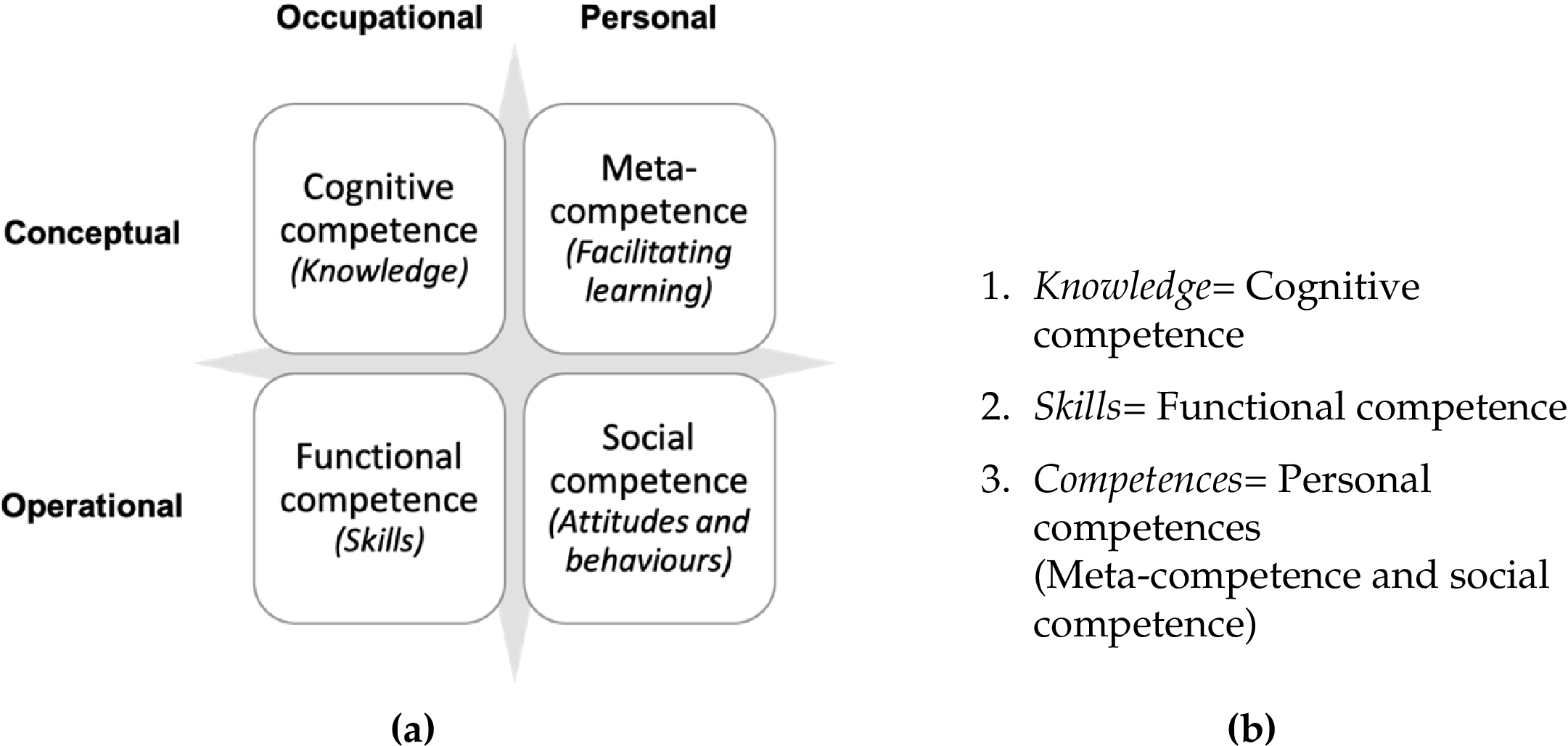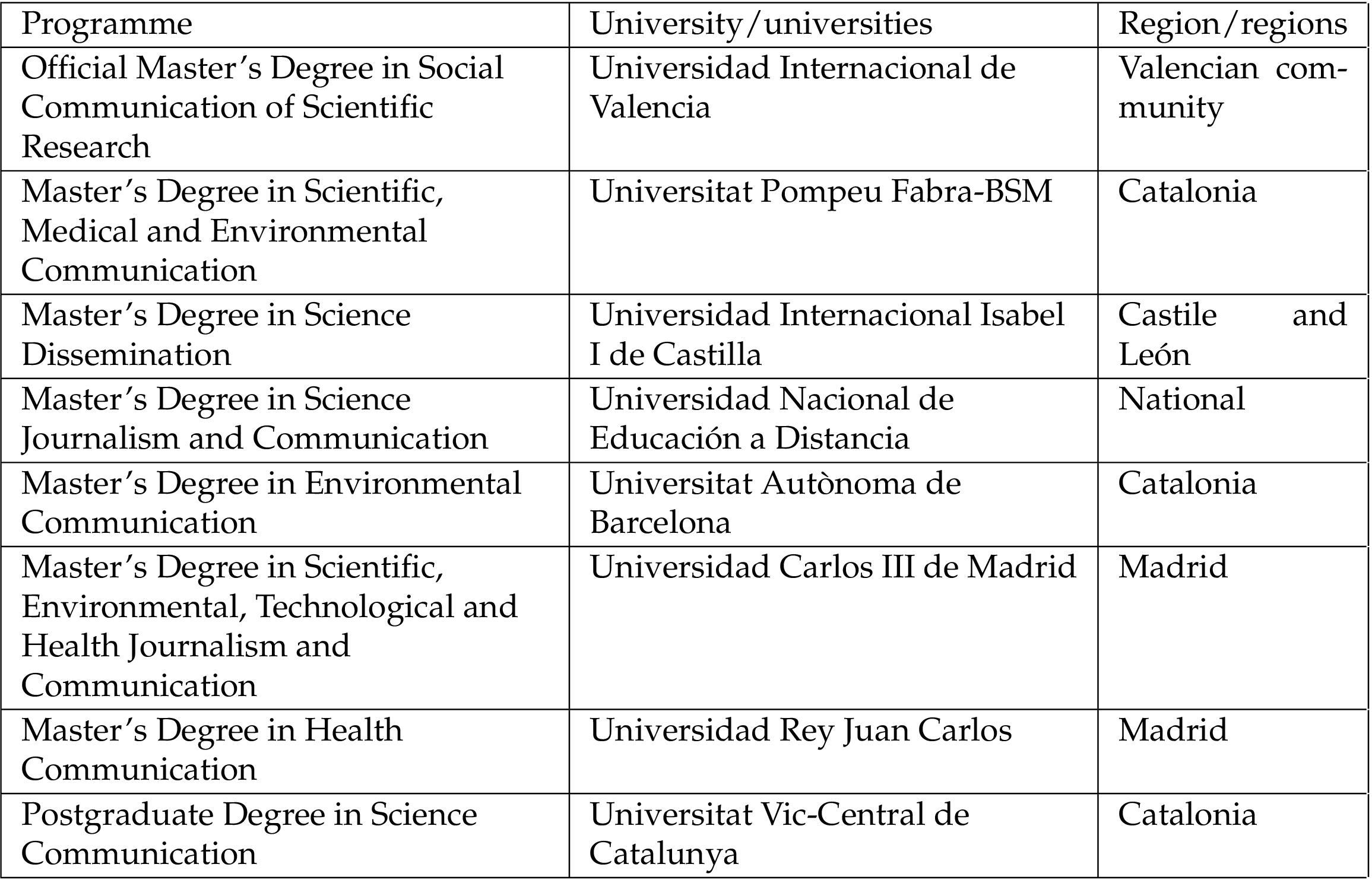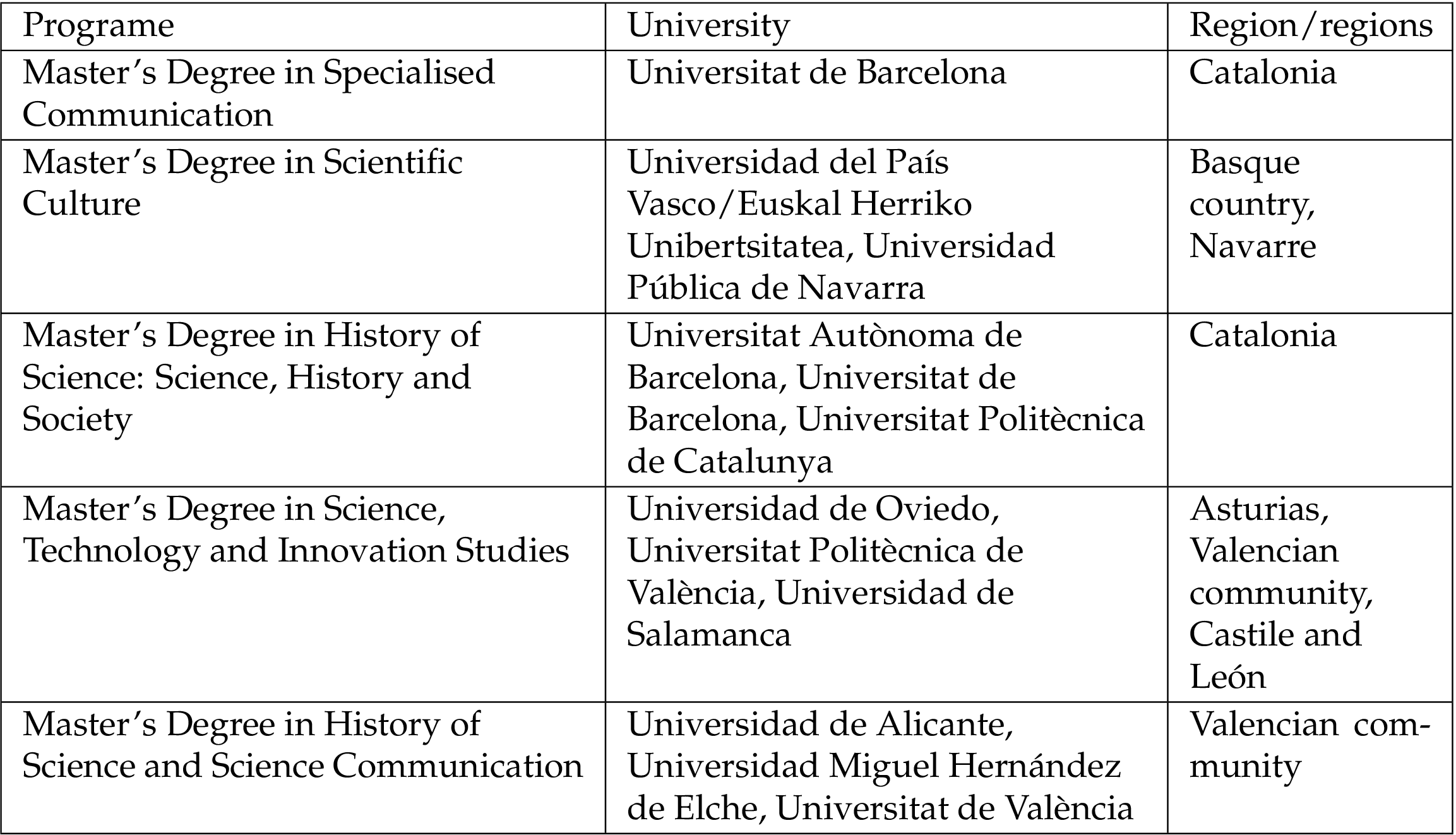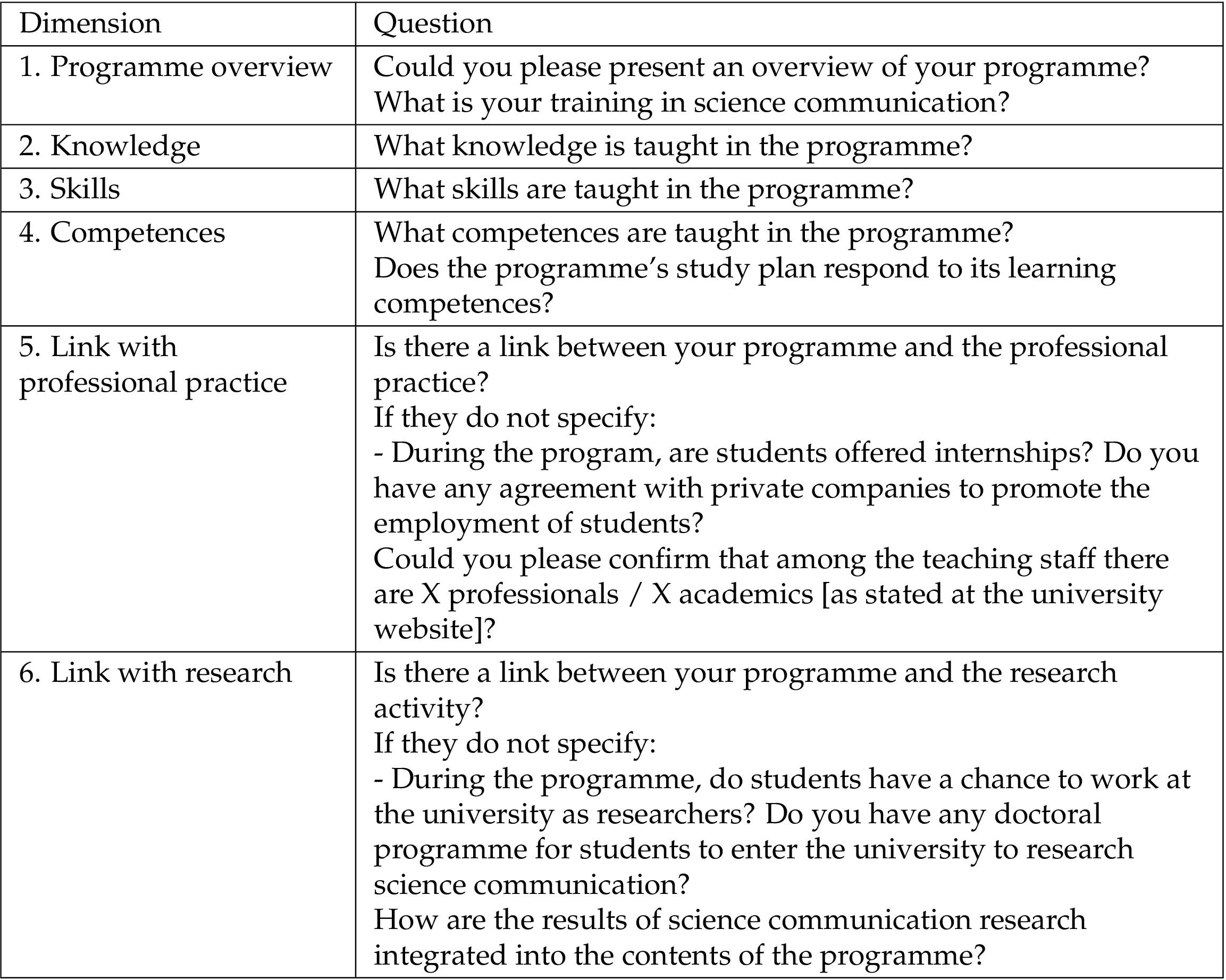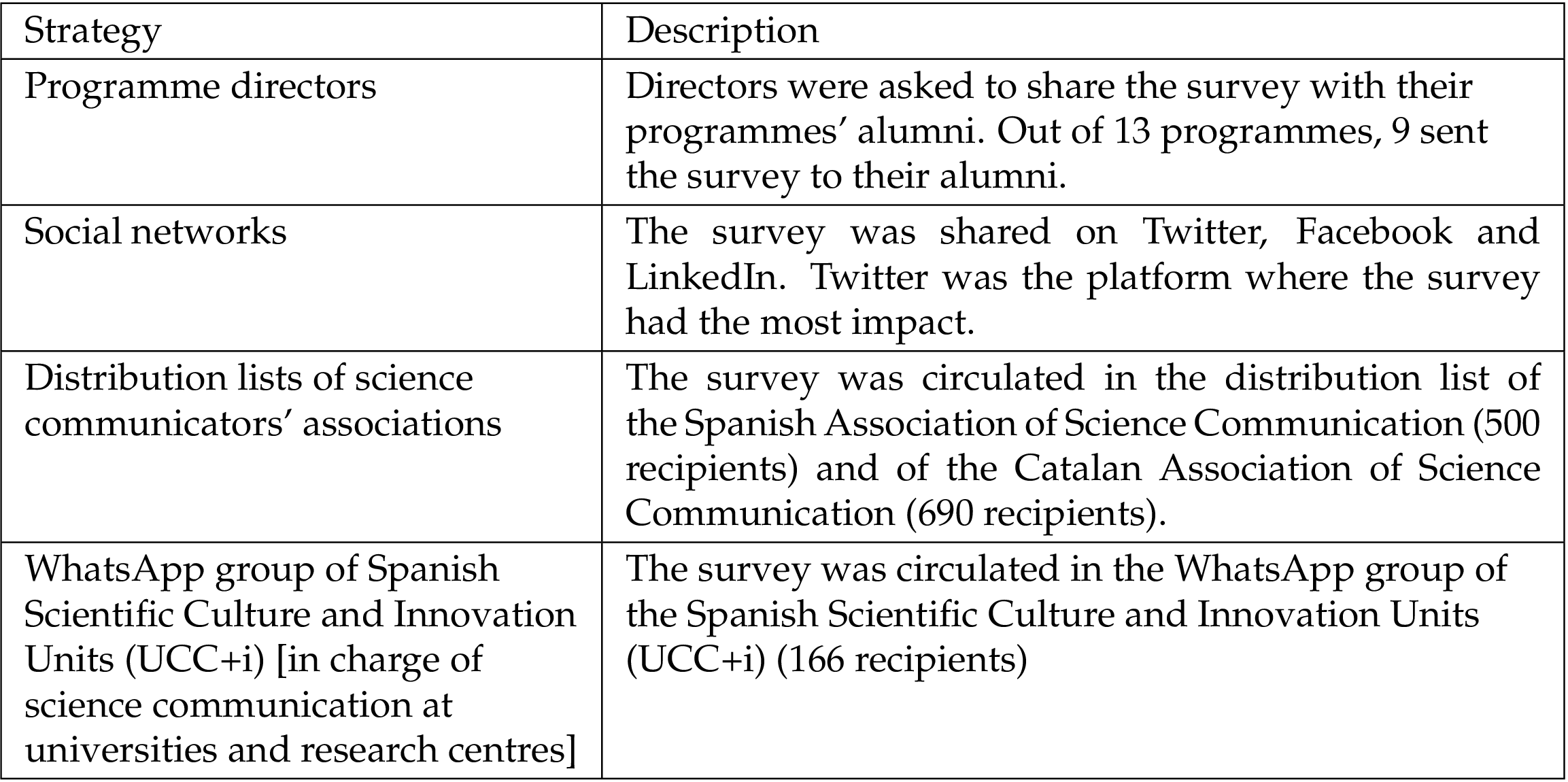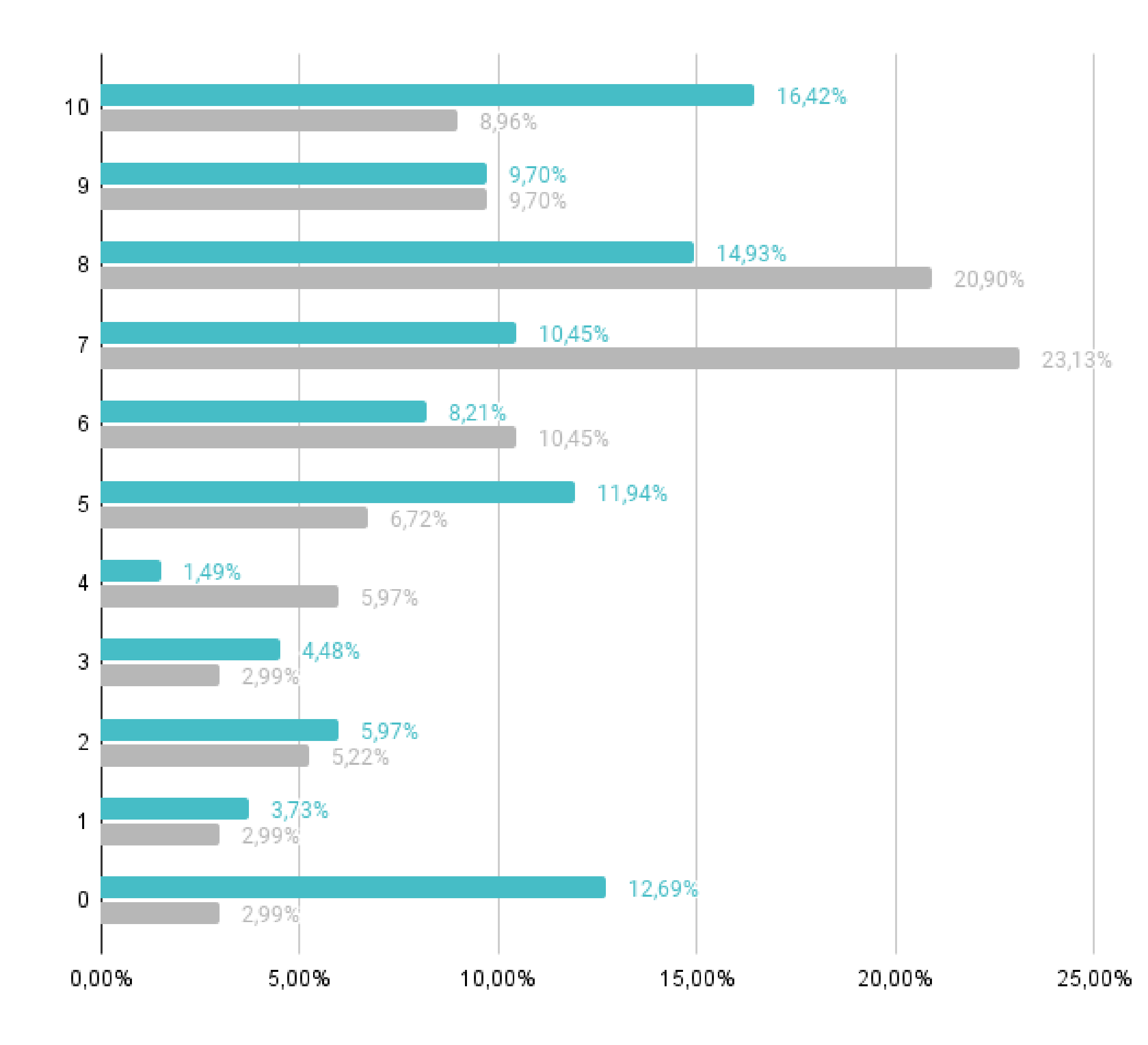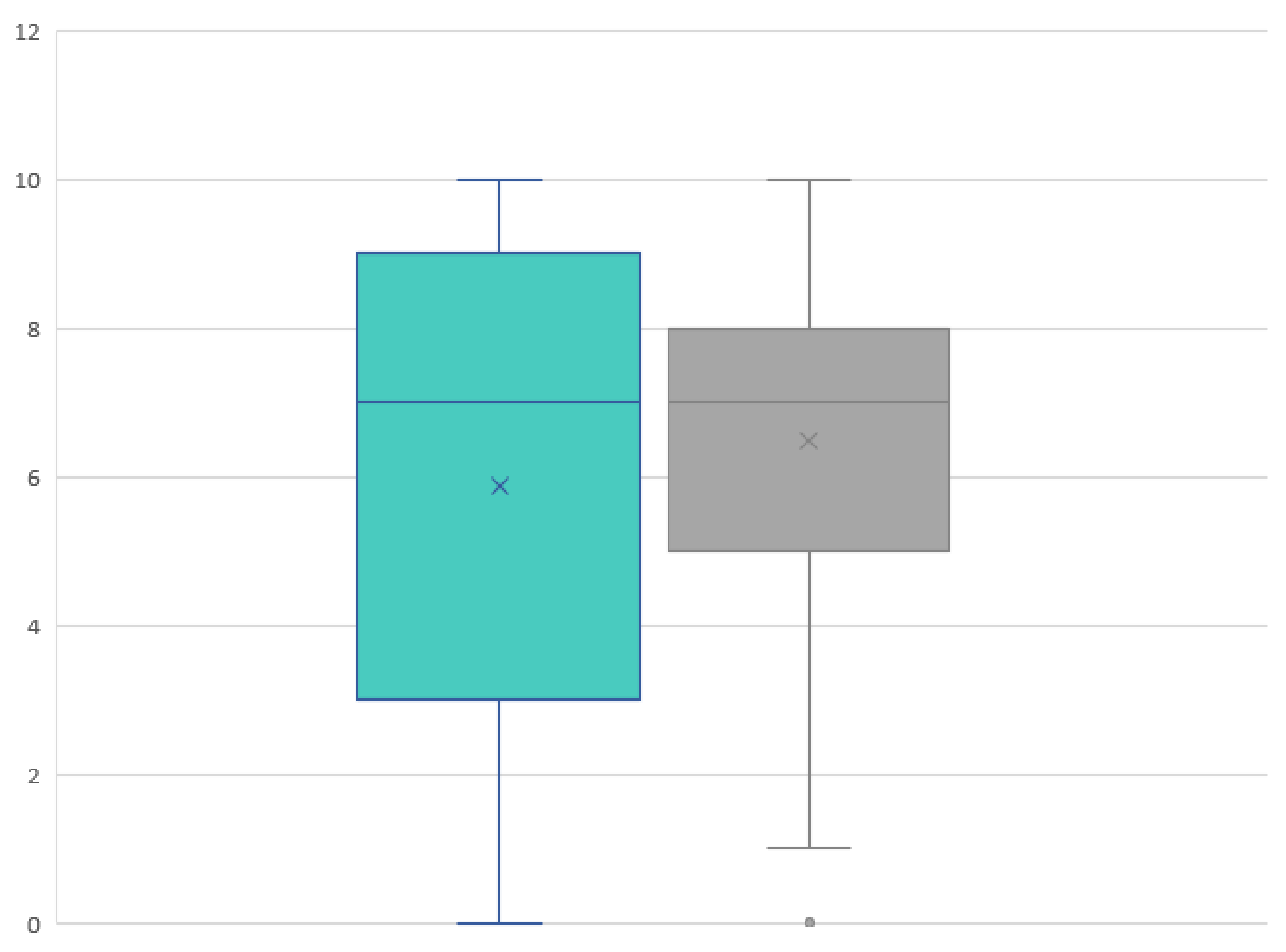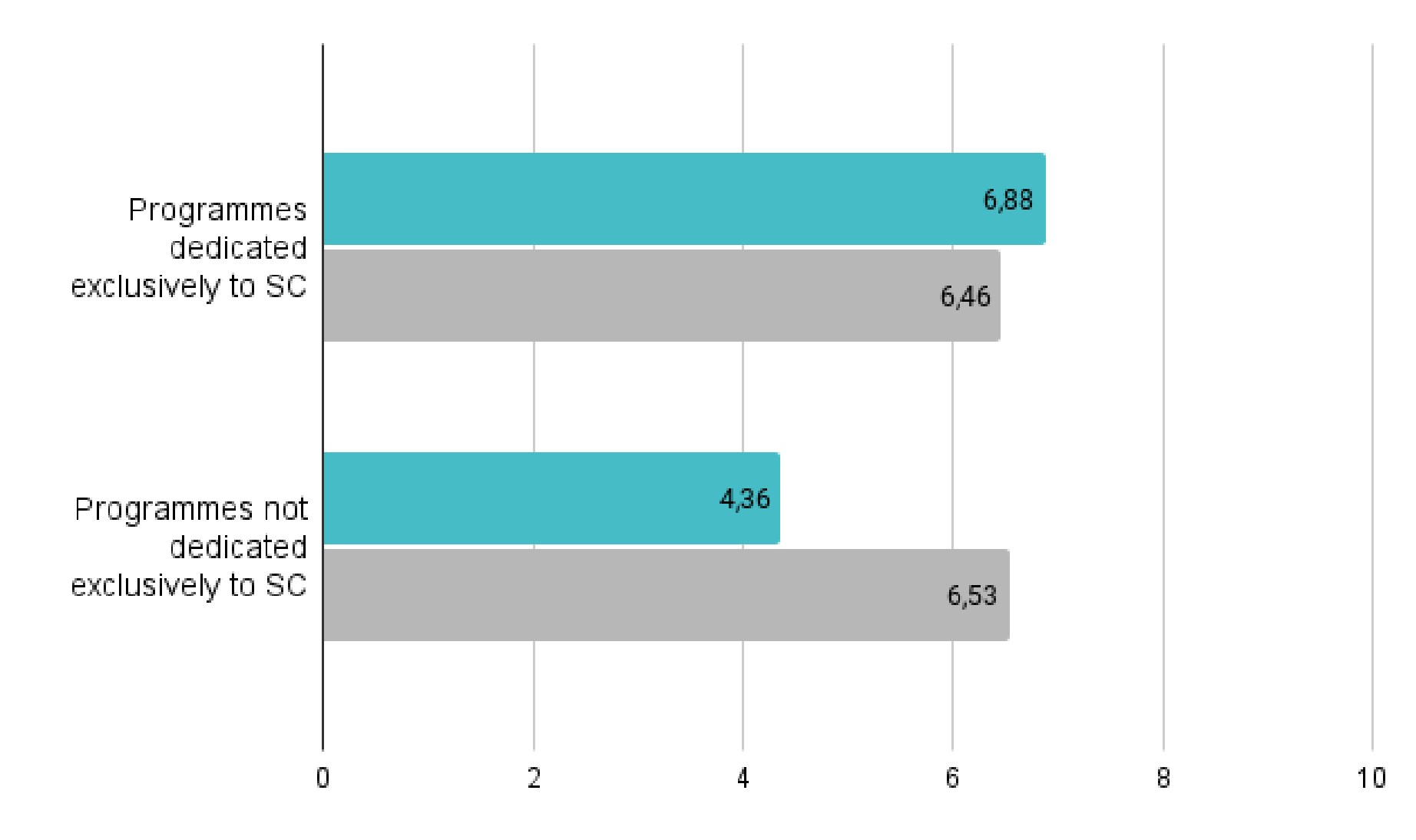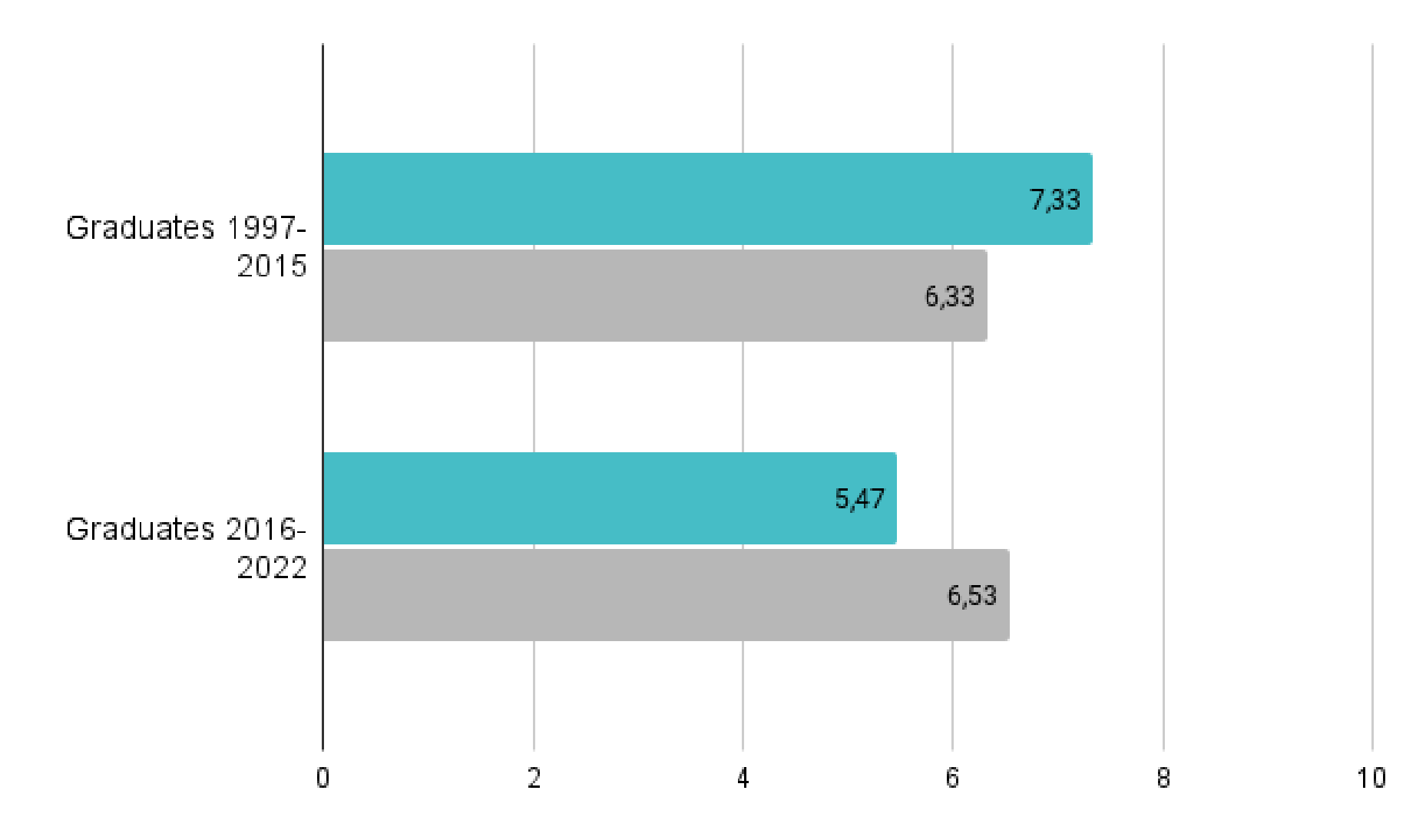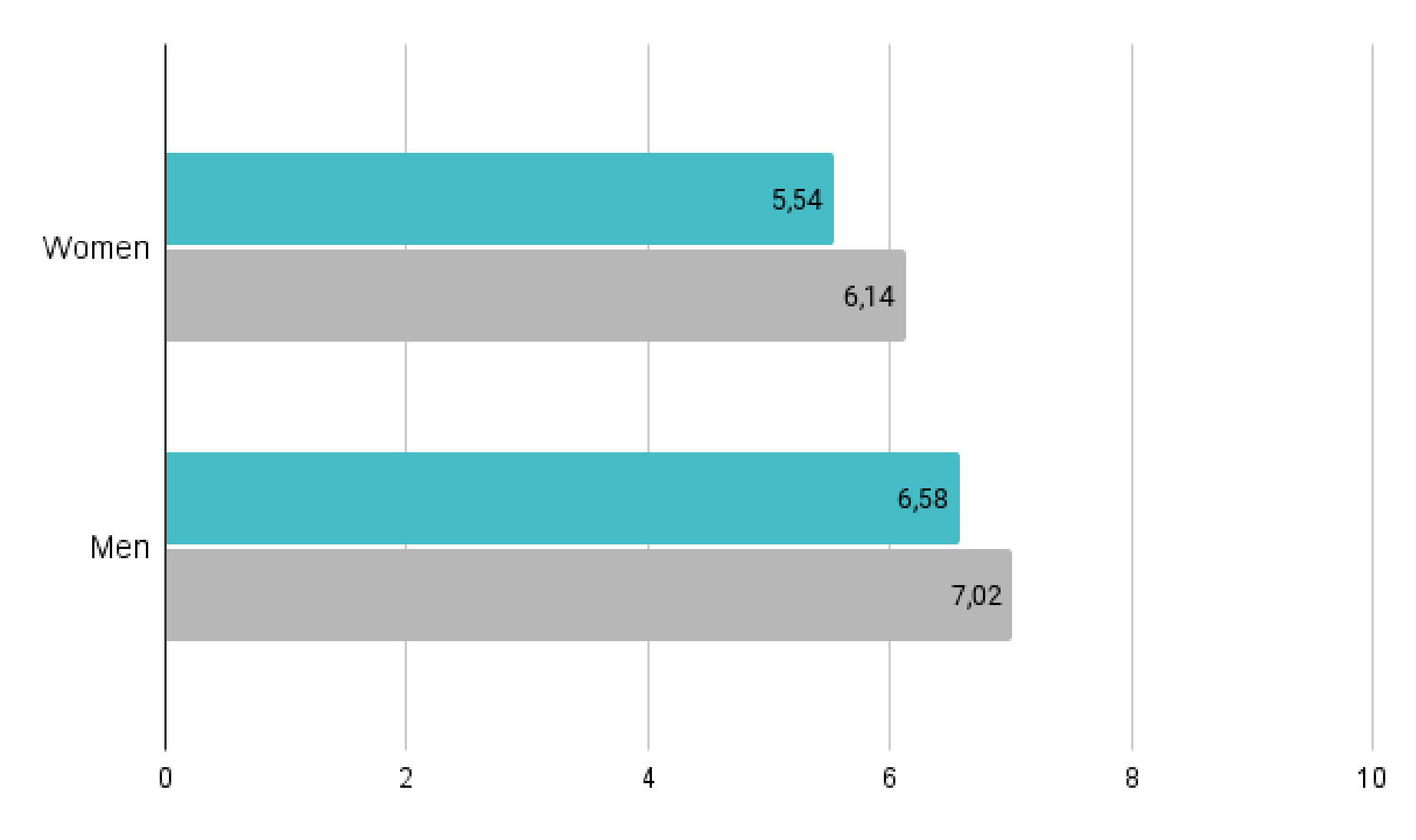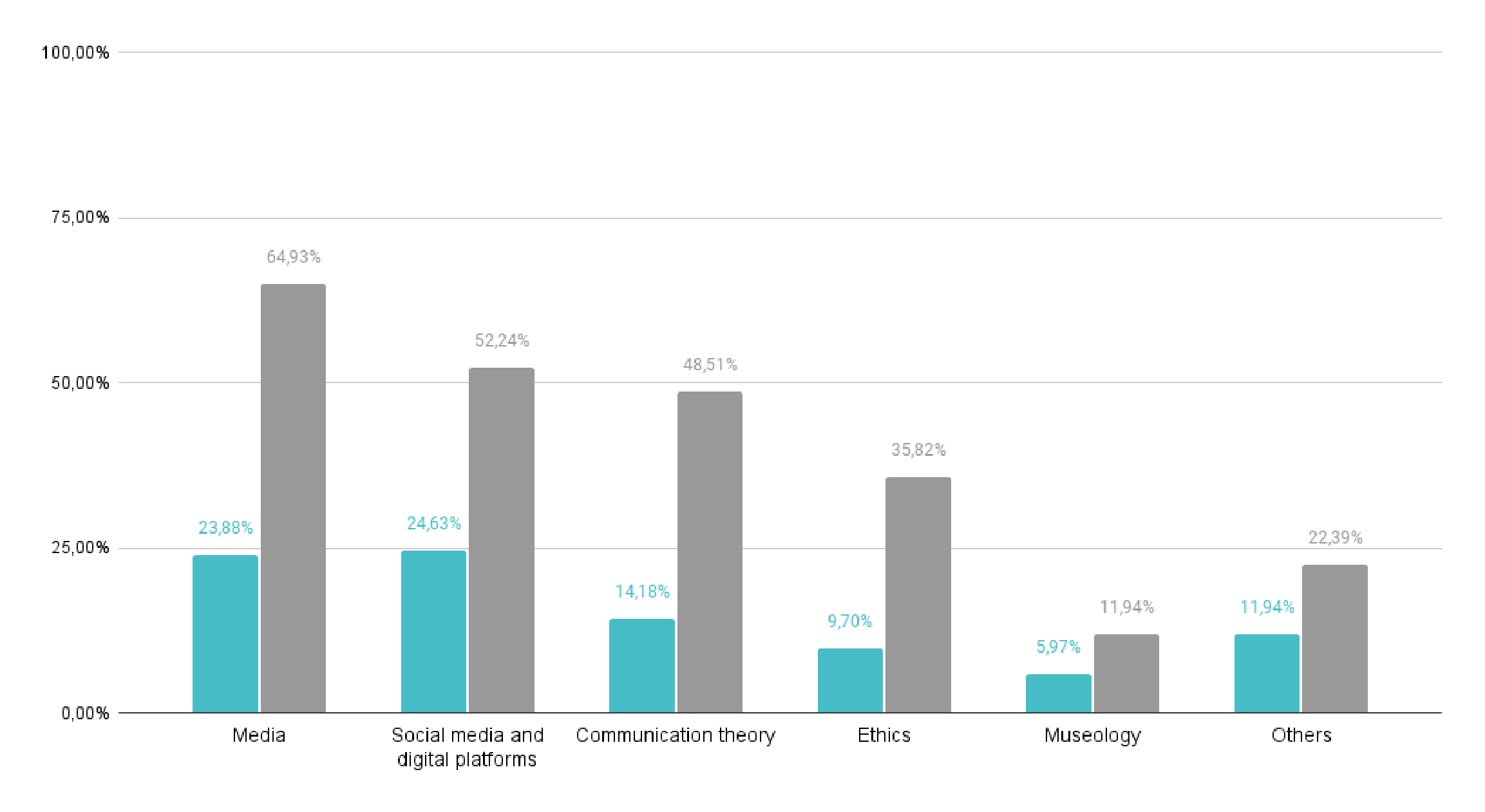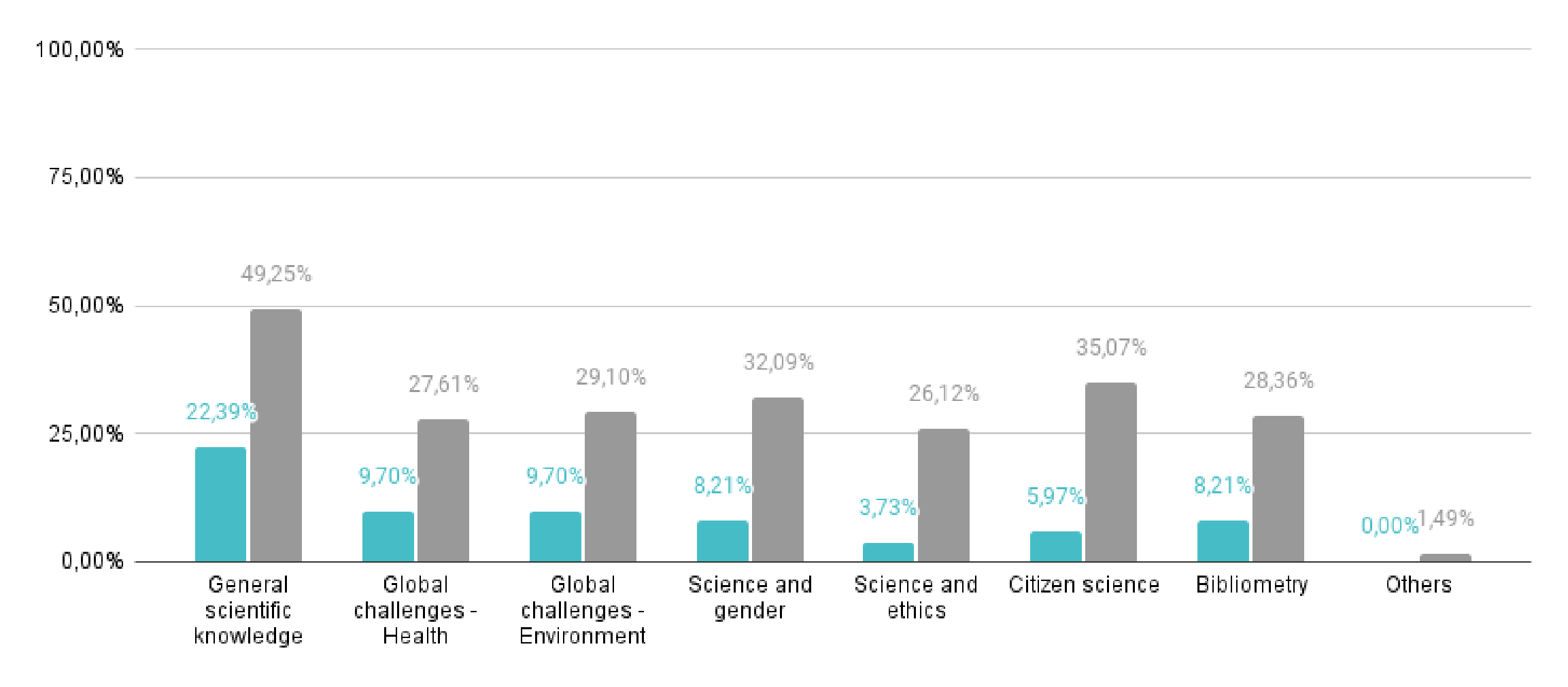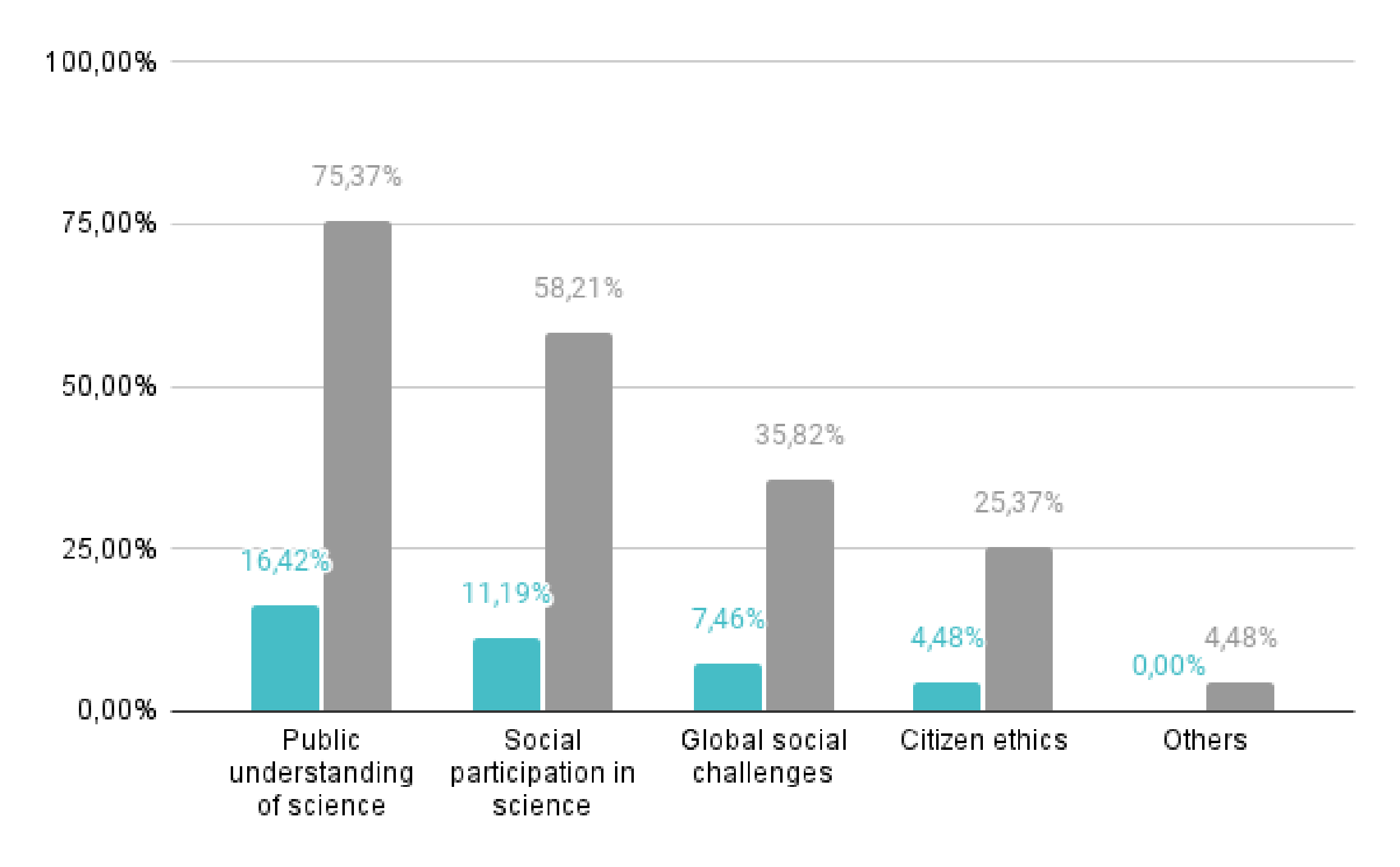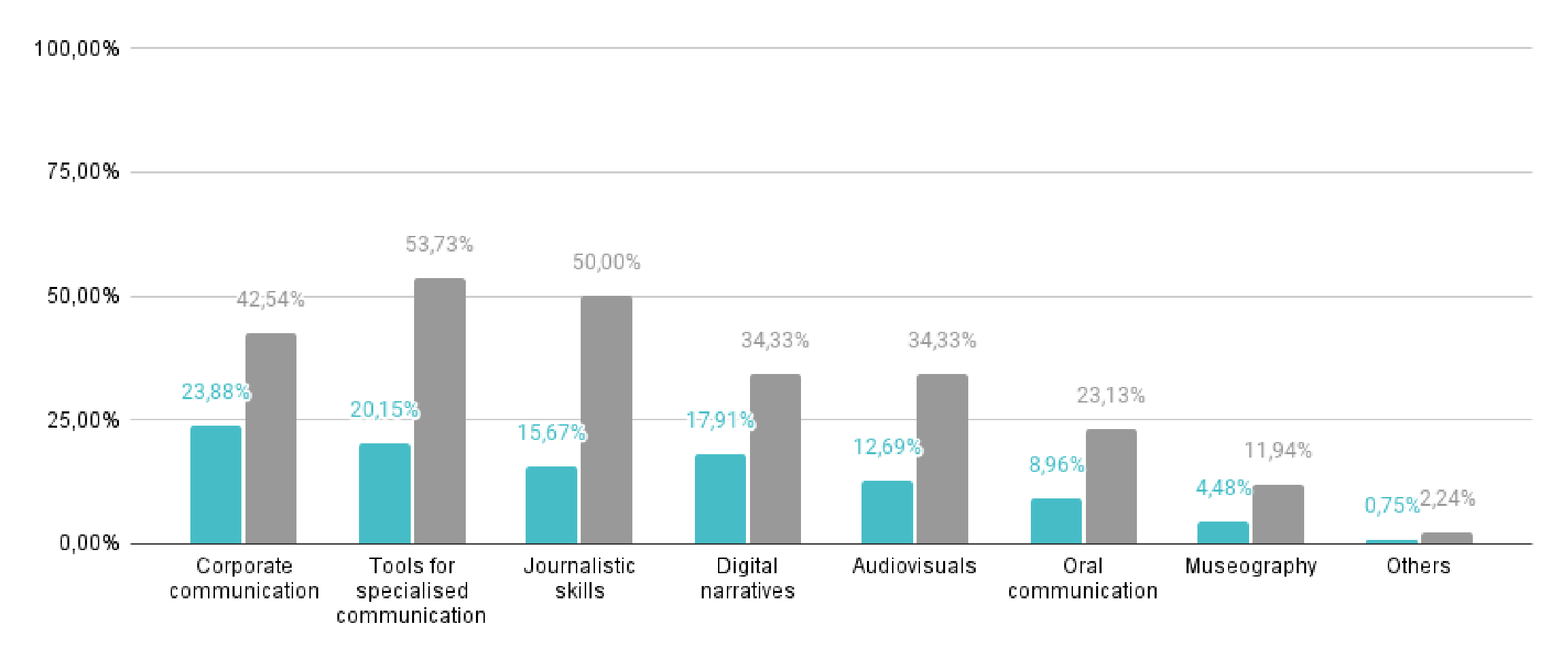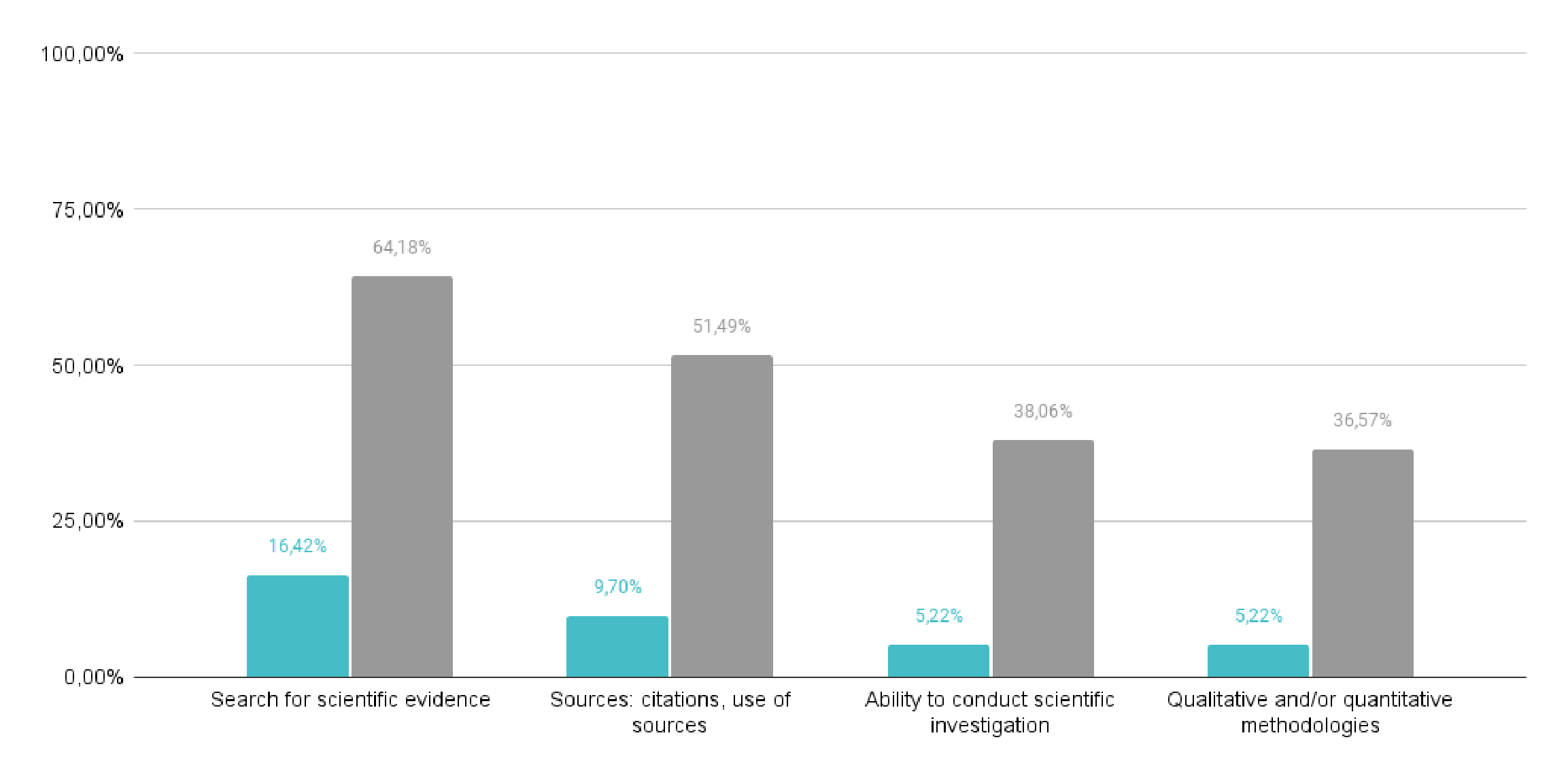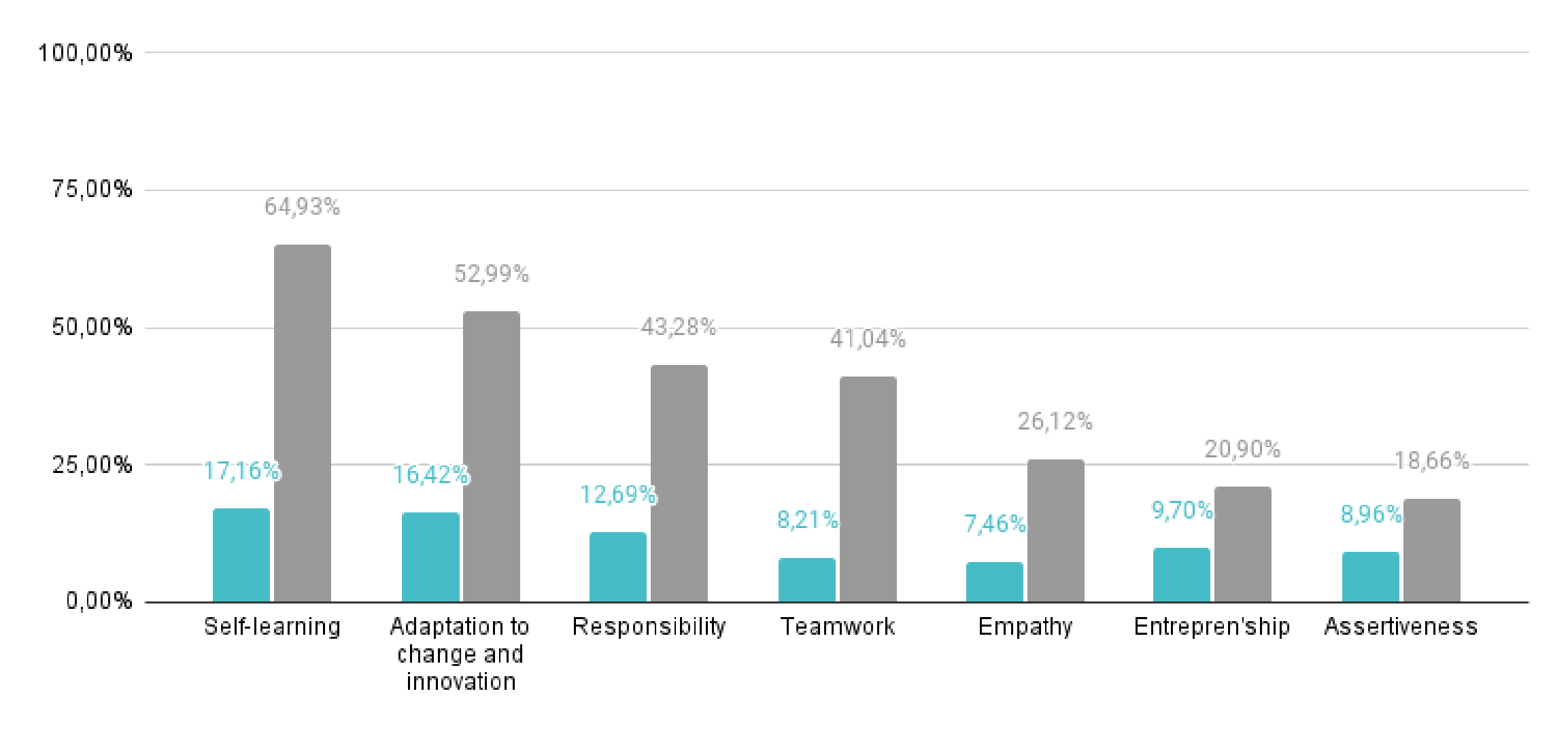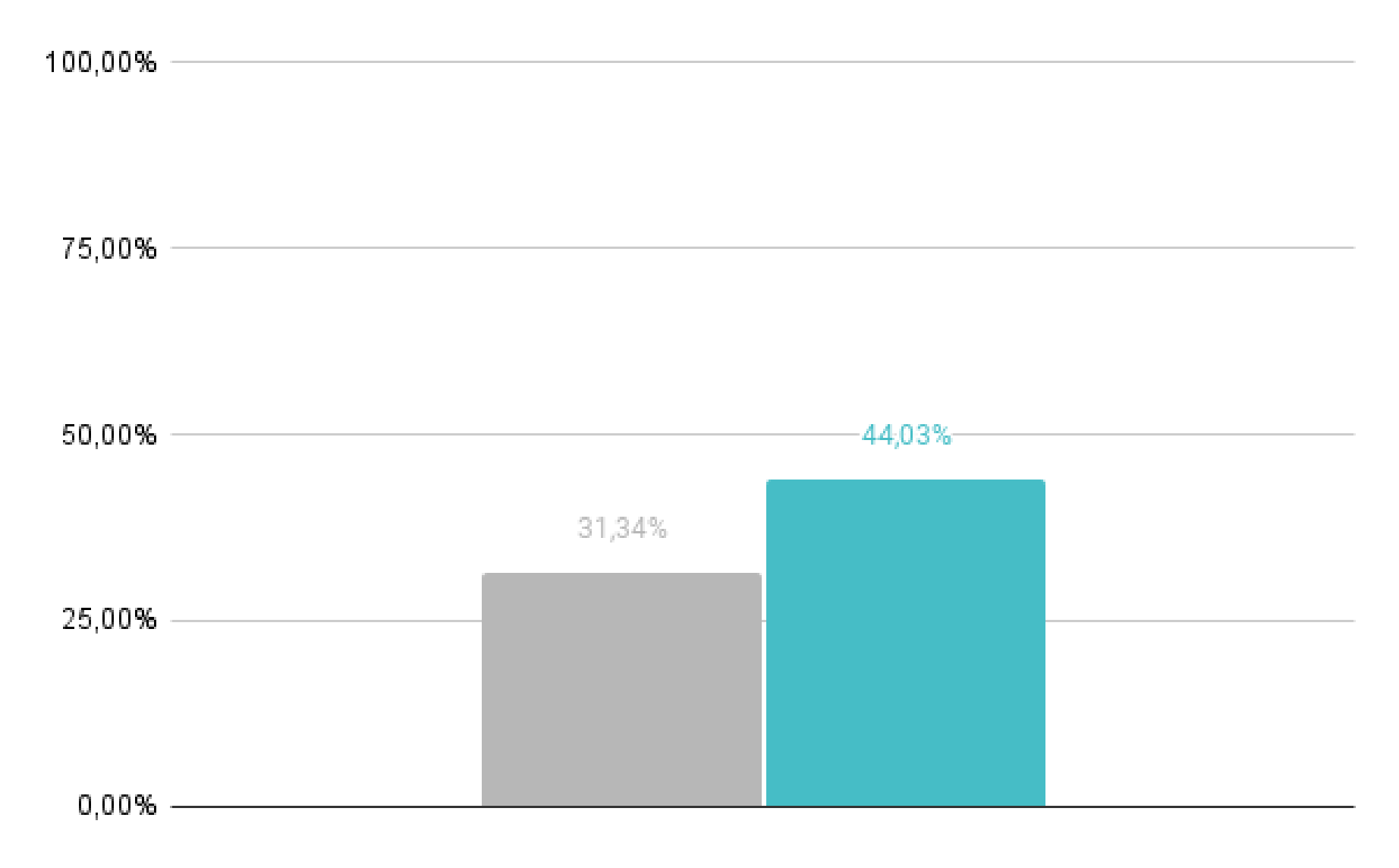1 Context
In the current context in which science communication is at a moment of transition [Davies et al., 2021], trained professionals are more necessary than ever. Science communication training is key to raising not only the standard for those starting a career in the field, but also the overall level of competency of the whole profession, as it legitimises and defines science communication at the professional level [Gascoigne et al., 2010]. Some authors add that training professional science communicators is a key element for the development of the field [Massarani, Reynoso-Haynes, Murriello & Castillo, 2016]. Some have raised the need for professional science communication for those working in public information of science [Baram-Tsabari & Lewenstein, 2017], while others consider science communication training a vital piece in our science- and technology-dependent world, where planetary and diversity and inclusion issues call for an informed society [Reynoso-Haynes, 2009]. Finally, some authors specify not only that dedicated science communication courses are needed, but that they should help students develop a broad understanding of the scientific and social issues around them [Bray, France & Gilbert, 2012].
Specialised training in science communication has several decades of history in many countries around the world [Gascoigne et al., 2010]. Since the mid-1980s, science communication has spread as a university subject, and mainly as a master’s degree [Trench, 2012]. Particularly in recent years, an increase in science communication training courses has been observed [Lewenstein & Baram-Tsabari, 2022].
Science communication is a well-understood term as an object of study and research around the world [Gascoigne et al., 2010], regardless of how interdisciplinary the theoretical underpinnings of its training can be: science, education studies, social studies of science or communication studies [Mulder, Longnecker & Davis, 2008].
Moreover, there are some descriptive studies about science communication training, albeit not recent and not exploring their impact on the professional development of its graduates. de Semir [2009] described the first science communication master’s programme in Spain. Vogt, Knobel and Camargo [2009] analysed their recently created programme in Brazil, and Murriello [2014] outlined two new programmes in Argentina. Mulder et al. [2008] made an international comparison and described the common elements for science communication programmes around the world. All these studies are highly useful to understand the wide variety of contents and trajectories of science communication programmes globally.
Massarani et al. [2016] analysed Latin American postgraduate programmes on science communication and found 22 courses distributed in 5 countries. All programmes were committed to offering specific contents in science communication, but were not consistent in terms of admittance requirements, goals, contents, approaches, duration and graduation requirements. Authors highlighted in their analysis that, to complete their study, it would be highly useful to learn about graduates’ career paths and the influence of programmes in their professional lives.
With a goal to make science communication training more systematic and structured, Lewenstein and Baram-Tsabari [2022] created a comprehensive list of topics for learning science communication. They organised the topics as essential or advanced, and specified if they were relevant for occasional, active, or professional science communicators.
Llorente and Revuelta [2023] identified two main models of teaching for science communication for professionals: the professional model and the research model. The professional model has two different approaches: theoretical (historical review, understanding of the science-society relationships, etc.) and skill-based (writing, audiovisual, social networks, etc.). Both approaches coexist in teaching programmes. The research model teaches tools, concepts, and methodologies for science communication research.
Mellor [2013] observed a diversification and professionalisation of science communication jobs, which could suggest good employment prospects for graduates [Mellor, 2013]. However, the link between the training courses and the impact on the professionalisation of their alumni has not been yet studied in detail. In this line, Longnecker [2022] stated that having better evidence for the impact of science communication teaching and learning would benefit the learning and teaching in science communication. The link between training contents and professional requirements can be so crucial that it has been said that science communication programmes live or die by the success of their graduates in finding relevant employment [Mellor, 2013].
We find in the literature some single programme analysis that conclude that science communication postgraduate degrees have a positive impact on alumni’s professional careers. Ramani and Pitrelli [2007] analysed the master’s degree in science communication at SISSA Trieste [Italy] and asked themselves the question “What professional future awaits those who have attended a school in science communication?”. They found that over 70% of alumni worked in science communication, and that the programme played a crucial role in finding a job in the field. Trench [2009] described the main characteristics of the master’s in science communication at Dublin City University [Ireland], and analysed alumni career paths. He found that graduates of the programme went on to work primarily in the areas of public information services, journalism, informal education, science-in-society programmes, science promotion and science policy. After 12 years of running their diploma in science communication in Mexico, Reynoso-Haynes [2009] analysed the course by engaging external professional evaluators. The analysis found that most alumni became professional full-time science communicators. Mellor [2013] did a historical review of the master’s programme offered by the Imperial College London [U.K.], studying not only the journey of the 20 years of the programme but also looking into its graduates’ careers. The author found that graduates hold a wide range of positions, with television and radio being the two most common sectors of work. McKinnon and Bryant [2017] studied the impact that the Australian programme ‘Science Circus’ had on alumni career paths and skill development after 30 years of running the program. Their findings showed that ‘Science Circus’ graduates went on to work predominantly in government roles or as specialist freelancers. They also found that the diversity of roles had increased and that alumni contributed to the growth of science communication as an academic discipline and an industry in Australia and abroad. All these programmes have contributed to elucidate the major issue of science communication training and its impact, but they all have one limitation in common — by focusing on just one programme, it is not possible to know if their results are representative of their countries or regional contexts.
Based on the research available, we conclude that it is necessary to explore in more depth the impact of science communication training courses on alumni’s career development. Moreover, it is necessary to have studies exploring bigger universes, encompassing at least a whole country. This way, the impact of specificities of a single programme on the overall results get diluted. What’s more, obtaining the whole picture of a country can be of great relevance with a view to future comparisons between countries. Finally, having a broader view would allow for these comparisons to discern between essential and contextual results.
This study focuses in the case of Spain. There are good reasons to analyse this country: although Spain has been running specialised training programmes since 1994, which is longer than the global average by 7 years [Gascoigne et al., 2020], there is currently scant and outdated information on science communication training programmes [Calvo-Calvo, 2013; de Semir, 2009; Moreno-Castro & Gómez-Mompart, 2002]. It is also worth noting that, thanks to the shared language, part of the students trained in Spain were from Latin American [de Semir, 2009].
1.1 Knowledge, skills and competences
On top of asking ourselves whether science communication training impacts alumni’s professional development, we also want to ask which of these teachings have the biggest effect in their careers. During any training programme, students acquire different teachings. These can be divided into knowledge, skills and competences. The term “competence” has two main meanings, either 1) the outputs or results of training, or 2) the inputs or personal attributes required to achieve a competent performance [Hoffmann, 1999]. And while most competence definitions describe it as the integrated pieces of knowledge, skills and attitudes that can be used to carry out a professional task successfully [Baartman & de Bruijn, 2011], this is not universal and the term adopts different meanings depending on the purpose for which it is used [Hoffmann, 1999].
Winterton, Delamare-Le Deist and Stringfellow [2006] developed a typology of learning outcomes that presented four types of competence, divided into occupational or personal (Figure 1). Occupational competences are divided into cognitive competence, which we refer to as knowledge, and functional competence, which we refer to as skills. Personal competences, which are divided into meta-competence and social competence, are what we refer to in this research article as competences: the inputs or personal attributes required to achieve a competent performance.
2 Objective
The main objective of this study is to explore if the specialised training in science communication (academic masters and postgraduate courses, referred to as “training” or “teaching”) in Spain is useful for alumni to find a job and practice their roles.
The specific research questions are:
-
RQ1.
-
According to programme directors, what are the most commonly taught knowledge, skills and competences in Spanish science communication training programmes?
-
RQ2.
-
According to alumni, what are the most useful knowledge, skills and competences learnt in the programme to find a job?
-
RQ3.
-
According to alumni, what are the most useful knowledge, skills and competences learnt in the programme to practice their roles?
3 Methods
To respond to this study’s objectives, two methodologies have been used: semi-structured interviews with programme directors with a post-interview validation form, and a survey to alumni of identified programmes.
3.1 Interviews
In order to identify which postgraduate programmes offered specialised training in science communication in Spain, a content analysis of the websites of the 86 universities that exist in the country was carried out.1 The analysis was done between 31st October 2022 and 13th January 2023. We identified 13 programmes, belonging to 18 universities (15 state owned, and 3 privately owned). Out of these 13 programmes, 8 were dedicated to science communication exclusively, while 5 taught science communication together with other areas of knowledge [such as history or philosophy of science] (Tables 1 and 2). Masters are imparted in a variety of formats, including face-to-face, online or hybrid. All master’s programmes had 60 ECTS credits, while the one postgraduate programme amounted to 30 ECTS credits.2
Based on the information found online, we contacted the people identified as directors of these programmes (n=13; 9 male and 4 female directors). The first contact was made via email. If no answer was received after two attempts, a phone call was made. Finally, 12 of the 13 people contacted accepted the interview and only one rejected it due to unavailability.
Between the 18th of January and the 13th of February 2023, 12 semi-structured interviews were conducted with programme directors. Specifically, 7 of the interviews were with directors of programmes dedicated exclusively to science communication, and 5 with directors of programmes in which science communication is part of the course, taught together with other subjects.
The interview script was structured in six dimensions: 1) programme overview, 2) knowledge, 3) skills, 4) competences, 5) link with professional practice, and 6) link with research (Table 3). Each of these dimensions was represented in one or more questions. Although the objective of the last dimension (no. 6) was to analyse if the research advances in science communication were integrated into the contents of the programmes, and if so, how, we observed that on 8 out of 12 interviews, answers did not really respond to this question. For this reason, after the interviews, the question was reformulated and sent back via email to these 8 people, asking to please clarify the matter. They all responded, and this time the answers did address the objective of the question.
The average duration of the interviews was 0:37:19 minutes, ranging from 0:18:19 to 0:45:49 minutes. Interviews were conducted via the videoconference software Zoom and were transcribed during January and February 2023. Interviews were done in the language that interviewees preferred: 10 in Spanish and two in Catalan. The coding and qualitative analysis of the interviews was carried out using the qualitative research support programme ATLAS.ti (version 22).
To improve the accuracy, credibility, validity, and reliability of the methodology, investigator triangulation was used [Moon, 2019]. With this approach, more than one researcher collects or analyses data to help ensure that individual bias is better controlled in the research process. Thus, two researchers independently analysed and coded a sample of interviews as a means of calibration. To compare their results, a test for intercoder reliability was undertaken [O’Connor & Joffe, 2020]. The test showed a high degree of reliability between coders (79,59%). Discrepancies were discussed and resolved.
Finally, a response validation approach was implemented so that interviewees could validate interview and online data [Torrance, 2012]. This was achieved using an online post-interview form, which was sent to interviewees asking for specific details of their programme to verify the information available on their websites. Responses were received from the 27th of January to the 22nd of February 2023. The form had 17 questions and the response rate was of 100% (n=12) (appendix A).
3.2 Survey
An online survey for alumni was prepared (using Google Forms) to obtain information about the following dimensions: 1) the usefulness of the programmes to find and practice their job, 2) what knowledge, skills and competences were most useful to alumni to find and practice their job, and 3) demographic details, such as gender or current occupation. The survey consisted of 24 questions (15 closed and 9 open) and included a statement of informed consent and data protection details. The questions related to the usefulness of the programmes to find and practice a job offered a scale from 0 to 10 (in which 0 = “not at all”, and 10 = “it was decisive”) (appendix B).
To identify which knowledge, skills, and competences should be included in the closed questions of the survey, those previously identified in the literature were considered, as well as from the interviews with programme directors. The open questions helped enrich the closed ones.
The survey’s target audience were people who had completed any of the 13 programmes identified, regardless of their graduation year. To calculate the N of our research (that is, the total number of alumni that make up the universe we wanted to study), we estimated the total number based on how many years had a programme been running and the number of places offered. This calculation gave us an N=4325.
It was unrealistic to expect all alumni to receive the survey, not only because of the high number estimated (N), but also because not all of them lived in Spain and the first graduates finished their studies more than twenty years ago.
The survey was available between 15th February and 6th March 2023. The survey was widely disseminated to reach as many alumni as possible. In particular, three strategies were used (Table 4):
In total, 150 people responded the survey. Of those, 16 responses had to be rejected because they belonged to people who either had not completed a master’s or postgraduate degree (but rather doctoral or expert courses) or had not yet graduated. The total of valid responses was 134.
With a confidence interval of 95%, and a 10% margin of error, the number of responses obtained (n=134) is representative of the universe studied (N=4325). However, it must be considered that this is not a sample chosen at random, but rather is made up of those who fulfilled two conditions: a) they received the survey through one of the channels used, and b) they were willing to answer it.
4 Results
4.1 Interviews
Results from the analysis of the interviews with training programme directors are presented below, answering to RQ1 “According to programme directors, what are the most commonly taught knowledge, skills and competences in Spanish science communication training programmes?”. Information from the programmes imparting science communication exclusively, and those that include science communication as part of other content, are presented jointly because no significant differences have been observed in their results.
4.1.1 Knowledge
All programmes analysed (n=12) impart theoretical knowledge on science communication, according to their directors. Moreover, 6 programmes teach knowledge about the science and technology system, and 6 teach knowledge about the relationship between science and society.
4.1.1.1 Communication knowledge. All programmes teach theoretical knowledge on science communication (n=12); in particular, on communication theory (n=8), museology (n=7) and science journalism (n=7).
“We teach the different theoretical models that exist about the communication of science” [E-12]
“We want students to know the bases of communication very well, the classical theory of communication, but also what the current information ecosystem is, how information is consumed, what are the information flows, the transformations that have occurred in this ecosystem over the years” [E-5]
4.1.1.2 Science and technology knowledge. Of the 12 programmes, 6 teach theoretical knowledge on science and technology [such as the nature of science and knowledge production processes]. 5 programmes teach theoretical aspects related to research methodologies.
“The methodologies used to study science communication (…) as an object of study, not as a professional practice” [E-8]
“Students are told what research is and what are the techniques to carry it out (…), what is a focus group, an in-depth interview, a survey and so on” [E-6]
4.1.1.3 Science and society knowledge. Of the 12 programmes, 6 impart theoretical knowledge about the relationship between science and society. Of these, 3 are about citizen science, that is, about involving society in research.
“We talk about the public understanding of science, the public or social perception of science, the emergence of new relationships between science and the public, ‘quadruple helix’ innovation, everything that would be public engagement from a more theoretical perspective, what research knows today about these relationships that can help us to be better communicators” [E-5]
4.1.2 Skills
All 12 programmes teach skills related to communication. Skills related to the science and technology system are taught in 8 programmes, and skills about the relationship between science and society are taught in 2 programmes.
4.1.2.1 Communication skills. Of the 12 programmes, 8 teach skills related to written and oral expression. These include skills such as writing blog articles or research articles, public speaking and non-verbal communication techniques.
“Reading, writing and speaking (…) we place a lot of emphasis on this; that students are able to read specialised texts, that they are capable of producing specialised texts, and that they feel capable of participating in a debate exposing ideas based on these texts” [E-8]
“There are many practical activities (…), doing a podcast, opening social network accounts, the classic elevator pitch exercise” [E-1]
4.1.2.2 Science and technology skills. Of the 12 programmes, 8 impart skills related to the science and technology system, focused on research methodologies skills. Of these, 4 teach about the use of sources and 4 about the preparation of bibliographies.
“The accurate search and location of scientific and academic bibliographic search engines to be able to carry out good research and write about that research appropriately” [E-10]
“The basis of methodologies at a qualitative and quantitative level, how to search for information, how to write bibliographic references” [E-3]
4.1.2.3 Science and society skills. Only 2 programmes teach skills on the relationship between science and society. In both cases, they are skills related to citizen science or citizen participation.
“We teach (…) how to set up a focus group, how to hold a consensus conference, how to do citizen science, that is, to also involve society in scientific projects or activities” [E-12]
“How to design a communication or citizen participation activity, how to set its objectives, how to design the entire activity, evaluate it, write its budget, for example” [E-5]
4.1.3 Competences
When directors were asked about the competences of their program, 11 understood that they were being asked about the curricular requirements in Spain (i.e., the official classification of competences, according to the Spanish system). However, throughout the interviews, information was obtained about the competences as they are understood in this article: that is, social competences (attitudes and behaviours) and meta-competences (the competency to learn). Of the 12 programmes, 5 include skills related to the development of critical thinking or focused on reflection. Other competences mentioned include: teamwork, an understanding of the relevance of science and technology in society, or professional ethics.
“That students also understand that science and technology are not done in the same way anywhere, but that all of this is constrained by a series of values” [E-12]
“What we also try, under a competency approach, is to work not only on instrumental technical learnings but also on a critical approach that allows you to question your audience, and then ask questions, which for us is something crucial” [E-6]
4.2 Survey
The information below responds to RQ2, “According to alumni, what are the most useful knowledge, skills and competences learnt in the programme to find a job?”, and RQ3, “According to alumni, what are the most useful knowledge, skills and competences learnt in the programme to practice their roles?”.
4.2.1 Usefulness of the programme to find and practice a job
When asked “To what extent what you learnt in the programme helped you find a job?”, 71,64% (n=96) responded with a score of 5 or more (on a scale of 0 to 10) and 28,36% (n=38) with 4 or less. At the extremes, 16,42% considers it was decisive to find a job (responds with a 10) and 12,69% thinks it was of no use (responds with a 0). The average score of the responses is 5,88, with a median of 7,00 points and a mode of 10,00 (Figures 2 and 3).
When asked “To what extent what you learnt in the programme helped you practice your job?”, 79,85% (n=107) responded with scores from 5 to 10 and 20,14% (n=27) scored between 0 and 4. At the extremes, 8,96% believe that it was decisive (responds with a 10) and 2,99% think that it was useless (responds with a 0). The average score is 6,48, the median is 7,00 and the mode is 7,00 (Figures 2 and 3).
For the alumni of programmes dedicated exclusively to science communication, the average score on the usefulness to find a job is 6,88, and of 6,46 to practice their job. For the alumni of programmes that do not exclusively teach science communication, the average score on the usefulness to find a job is 4,36, and 6,53 to practice their job.
For alumni graduated between 1997 and 2015, the average score on the usefulness of the programme to find a job is 7,33, and 6,33 to practice their job. For alumni graduated in or after 2016, the average score on the usefulness to find a job is 5,47, and 6,53 to practice their job.
For women, the average score on the usefulness to find a job is 5,54, and 6,14 to practice their job. For men, the average score on the usefulness to find a job is 6,58, and 7,02 to practice their job.
Segregating by sector, alumni working in the field of journalism and media are the ones that report higher usefulness scores, with an average of 8,36 to find a job and 7,09 to practice their jobs. Among those working in the field of journalism and media (n=11), the training was more useful to those with a scientific background than those with a background on communication (8,6 vs. 8,2 to find a job, and 7,8 vs. 6,2 to practice their job). However, the sample is too small to be statistically significant. On the other hand, alumni that are not working or researching in science communication are the ones that report lower usefulness scores, with an average of 2,36 to find a job and 5,71 to practice their jobs.
In total, 114 people wrote a comment (voluntarily, since the question was optional) about the two previous questions. In line with the numerical responses, most comments were positive (n=85, 74,56%), highlighting the usefulness of the tools learned (n=35, 30,70%) and the applicability of the knowledge obtained (n=33, 28,94%). Among the negative comments (n=12, 10,53%), some said that their programme was not decisive in their professional practice (n=6, 5,26%), while others complained about the lack of practical exercises (n=5, 4,38%).
“The skills and tools acquired during the master’s degree have allowed me to be a better professional in my area”
“The little knowledge acquired during the master’s degree has an anecdotal role in my current job”
4.2.2 Usefulness of knowledge
Within communication knowledge, the most useful theoretical knowledge for alumni to find a job is social networks and large digital platforms (n=33, 24,63%), while, to practice their job, it is knowledge of the media (n=87, 64,93%) (Figure 7). The media category encompasses journalism, genres, the social impact of media, and how the media treat science.
Within science and technology knowledge, the most useful theoretical knowledge for alumni to find a job is encompassed under “General scientific knowledge. Nature of science. processes” (please note, “” stands for “Research, Development and Innovation”). 22,39% says it has been useful to find a job (n=30) and 49,25% to practice their job (n=66). To find a job, the next most useful knowledge are global challenges in health and the environment (n=13, 9,70% respectively). To practice their job, the next most useful knowledge, with 35,07% of responses, is citizen science knowledge (n=47) (Figure 8).
The knowledge related to the relationship between science and society that has been the most useful for alumni to find and practice their job is the social perception of science: 16,42% says it has been useful to find a job (n=22) and 75,37% it has been useful to practice their job (n=101). Next in usefulness are the social participation in science, which has helped 11,19% to find a job (n=15) and 58,21% to practice it (n=78) (Figure 9).
4.2.3 Usefulness of skills
For alumni, the most useful communication skills to find a job are those related to corporate communication, which encompasses skills such as organizing press conferences and writing press releases, strategic communication plans and spokesperson training (23,88%, n=32). The most useful communication skills to practice their job are tools for specialised communication, such as scientific, environmental or health communication (53,73%, n=72). Tools for specialised communication are also the second most useful skill to find a job (20,15%, n=27). To practice their job, alumni consider the second most useful journalistic skills such as journalistic writing and discourse analysis (50,00%, n=67) (Figure 10).
The research skills that have been the most useful for alumni both to find and to practice their job are those related to the search for scientific evidence, which encompasses aspects such as the critical reading of articles, the analysis of journals and the identification of their impact factor, or the management of scientific databases. This ability has been useful for 16,42% of alumni to find a job (n=22), and 64,18% to practice it (n=86) (Figure 11).
4.2.4 Usefulness of competences
The competency that has been the most useful for alumni, both for finding and practicing their job, is self-learning: 17,16% responded that it has been useful for them to find a job (n=23), and 64,93% to practice it (n=87). Next comes the competency for adaptation to change and innovation (16,42% to find (n=22) and 52,99% to practice their job (n=71)), and responsibility (12,69% to find (n= 17) and 43,28% to practice their job (n=58)) (Figure 12).
Summary of the results presented so far regarding alumni perception of usefulness of knowledge, skills and competences of programmes (Table 5).
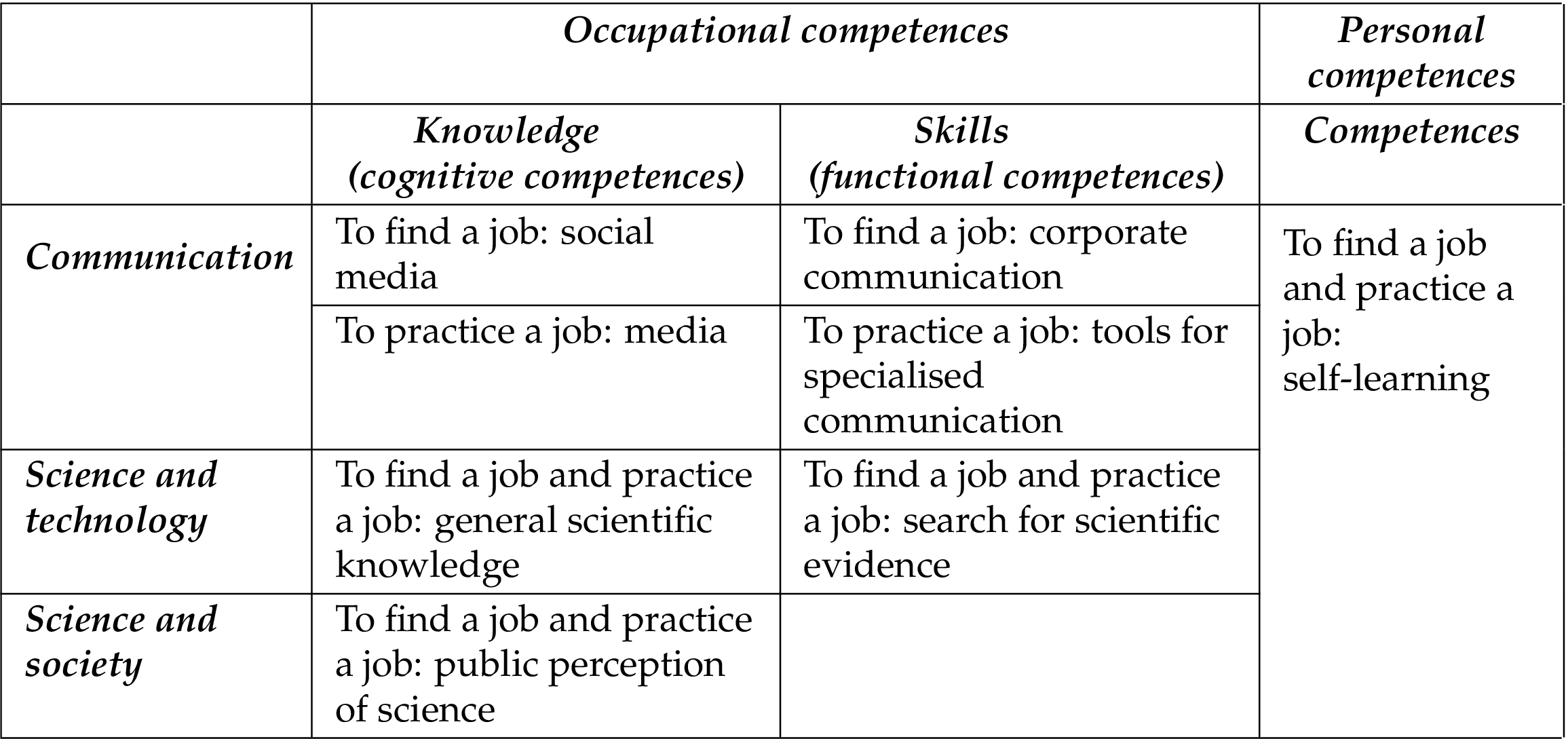
4.2.5 Network
In the survey, 31,34% of alumni responded that the contact network created in the programme has been useful to find a job (n=42), and 44,03% that it has been useful to practice it (n=59) (Figure 13).
Of the programmes dedicated exclusively to science communication, 40,74% of alumni consider the network created has been useful to find a job, and 45,68% that it has been useful to practice their job. Of the programmes not dedicated exclusively to science communication, 16,98% consider their network useful to find a job, and 41,51% to practice it.
Of the alumni graduated before 2016, 43,33% consider the network created has been useful to find a job, and 56,67% that it has been useful to practice it. Of the alumni graduated in or after 2016, 27,88% consider their network has been useful to find a job, and 40,38% to exercise it.
Moreover, 29,07% of women consider the network created has been useful for them to find a job, and 46,51% to practice it. For men, 35,56% consider the network created has been useful to find a job, and 40,00% to practice it.
For this question, 36 people have added a comment. Almost the same number of people make positive (n=14, 38,89%) than negative comments (n=15, 41,67%). Among the positive comments, the most common ones highlight the network created facilitated their job search or generated opportunities for future work (n=12). Among the negative comments, respondents mention that they do not use the network created or that it is not useful to them (n=13).
“The master’s network of contacts has been crucial to develop my work: development of joint projects, etc.”
“My master’s degree was online and we all worked quite independently, we didn’t create many contacts”
5 Discussion
This study, which analyses for the first time the impact of specialised training programmes in science communication in an entire country, concludes that these programmes are useful for its alumni, both for finding a job and for the regular practice of their profession. Results of this research also show for the first time the state of the art of specialised training in science communication in Spain at master’s and postgraduate level.
This study has approached, for the first time, those responsible for the training programmes (through semi-structured interviews) and also the alumni that studied them (through a survey).
According to survey responses, training programmes in science communication in Spain help their alumni to find and practice their jobs. Alumni highlight the usefulness of the tools learned and the applicability of the knowledge acquired. These results corroborate what has been previously found in other studies examining the impact of programmes on alumni’s careers, although these studies focused on a single programme [McKinnon & Bryant, 2017; Mellor, 2013]. Our study, however, provides an analysis of all the programmes in a country, something that had not been done until now.
Alumni reported that the communication knowledge that has been most useful for them in finding a job is related to social media, and to practice their job, is knowledge about the media. The science and technology knowledge that has been most useful for alumni both in finding and in practicing their job is general scientific knowledge. The science and society knowledge that has been most useful for alumni both in finding and in practicing their job is the public perception of science. The communication skills that have been most useful for alumni in finding a job are corporate communication, and in practicing their jobs, are tools for specialised communication. The science and technology skills that have been most useful in both finding and practicing their jobs are those related to the search for scientific evidence.
Regarding competences, the answers obtained in the interviews do not align with those obtained in the alumni survey: the competences that directors mention the most are those related to the development of critical thinking and reflection, and those that are the most useful to the alumni are those of self-learning and adaptation to change and innovation. This difference is relevant enough to require further analysis.
Lewenstein and Baram-Tsabari [2022] propose learning objectives for programmes dedicated to teaching science communication. They are divided into those ‘essential’, for occasional communicators, and ‘advanced’, for professional communicators. The results obtained in this study coincide with many of the advanced learning objectives described by Lewenstein and Baram-Tsabari. On the one hand, the authors highlight the objectives related to the different approaches to science communication, going beyond the deficit model to understand the different types of citizen participation, the arguments about the definition of scientific literacy, questions of lay knowledge and dialogue, among others. They also highlight knowledge related to communication theory, its objectives and processes, and the fact that good science communication requires multiple types of knowledge. These points are in line with what programme directors said during their interviews. Regarding the objectives of reflection, Lewenstein and Baram-Tsabari highlight the importance of knowing the historical, philosophical and social context of science, which is also in line with the results obtained from the interviews.
However, our results do not sufficiently capture some concepts identified by Lewenstein and Baram-Tsabari, such as “affective” objectives, which include the communicators’ motivation to participate in science communication activities. This is consistent with what Bray et al. [2012] observed as “essential elements of a graduate student science communication course”, moving away from technical skills and emphasizing the importance of empathic skills in interacting with the audience [Bray et al., 2012]. McKinnon and Bryant [2017] also emphasize that science communication training is more than just teaching specific skills and should explore a holistic assessment of impact at the community or societal level [McKinnon & Bryant, 2017]. Although it is true that the directors interviewed in this study highlight skills for the development of critical thinking and reflection, more research is needed in this line to discern whether the Spanish programmes include the “affective” objectives identified by Lewenstein and Baram-Tsabari [2022].
Moreover, the type of programme studied influences alumni responses. Alumni from programmes dedicated exclusively to science communication consider the training is more useful to find a job than alumni of programmes that teach science communication together with other subjects. This difference may be due to the fact that programmes that exclusively teach science communication might be have a more practical approach, although this would require further investigation.
Likewise, the year of graduation of alumni influences how useful the programme is to find a job, being more useful for people who have been graduated the longest. This seems logical if we take into account that recent graduates have had fewer opportunities to find a job, which in turns impacts their perception of the usefulness of their studies. On the other hand, no significant differences are observed in the usefulness of the programmes to practice their job.
Segregating by gender, training programmes are less useful for women than for men, both to find and to practice their job. Although this difference is not big, it is enough to require further study, as it could be due to either endemic inequalities between women and men when entering the labour market, or to a specific problem in the programmes analysed. In either case, it would be necessary to develop strategies to reduce these differences.
Segregating by current area of work, training programmes are the most useful for those alumni working in journalism and media sectors, while they are the least useful for those alumni not working or researching in science communication. These results show that students that end up working in the field of journalism and media are the ones that consider their training to be most useful. However, it is worth noting that only 11 out of 134 alumni responses (8,2%) are working exclusively in such a field.
Regarding the contact networks created, less than half of alumni indicate that they have been useful to find or practice their job, and there are almost the same number of positive comments as negative ones for this question. Alumni of the programmes dedicated exclusively to science communication consider contact networks more useful than alumni of the programmes that teach science communication among other topics. It can be inferred with the answers to the open question that online programmes don’t favour connections as much as other type of programme. Another explanation could be that the majority of those surveyed are recent graduates: segregating by year of graduation, we observe that alumni who graduated before 2016 consider their networks more useful than alumni who graduated in or after 2016. It will be necessary to further this research to find out if contact networks consolidate over time.
Based on the results obtained, directors of science communication programmes in Spain could consider a few aspects to help alumni secure work and thrive in their jobs. For instance, a more rational offering and geographical distribution of the training (currently, training programmes are concentrated in only 7 out of the 17 autonomous communities); actions to improve the positive impact of these programmes specifically for female graduates, as statistically significant gender differences have been observed; or the strengthening of existing relationships between the professional environment and training programmes, as well as between these programmes and the research outcomes in the field of science communication.
5.1 Limitations of the study
One of the limitations of the study is that, to know the impact of training programmes on their alumni’s professional activity, we have analysed opinions and perceptions, so a certain degree of subjectivity must be expected in the responses. To limit this shortcoming as much as possible, we have introduced various triangulation methods. Two different populations (directors and alumni) have been studied. In the case of directors, their interviews have been complemented by a content analysis of the information available on their universities’ websites, together with a response validation form. In addition, the research has included a survey for alumni which included closed and open questions.
The alumni survey has other limitations. First, of the 13 programmes identified, we have received responses from alumni from 11 courses. This means that there are 2 programmes without representation: the Master’s Degree in Health Communication, from Universidad Rey Juan Carlos, and the Master’s Degree in Environmental Communication, from Universitat Autònoma de Barcelona. The former is in its first year, so there are no alumni yet to respond the survey. We don’t know why no alumni from the latter answered the survey; it could be because not enough dissemination of the survey was done for this programme, or it was not done effectively enough.
Another aspect to consider is that a large number of responses have been obtained from very recent graduates: 40% of responses are from students who graduated in 2021 and 2022. This high representation of recent graduates may have an impact on the survey results, since they were asked about finding a job and practicing it. For obvious time constraints, these graduates have not had much time to enter the workforce.
To establish whether the number of responses from each programme is representative, an approximate calculation of potential alumni was made. The sample collected is representative of the total, but individually, some programmes are underrepresented or overrepresented.
The most underrepresented programmes are: the Master’s Degree in Journalism and Science Communication from Universidad Nacional de Educación a Distancia (we estimate this programme’s alumni account for 18,13% of the total, but they only represent 4,48% of survey responses); and the Master’s Degree in Social Communication of Scientific Research from Universidad Internacional de Valencia (we estimate this programme’s alumni account for 13,44% of the total, but they only represent 4,48% of survey responses).
The most overrepresented programmes are: the Postgraduate Degree in Science Communication of the Universitat Vic-Central de Catalunya (we estimate this programme’s alumni account for 3,84% of the total, but they represent 10,45% of survey responses); and the Master’s Degree in History of Science and Science Communication from University of Alicante, Universidad Miguel Hernández de Elche and Universitat de València (we estimate this programme’s alumni account for 4,44% of the total, but they represent 12,69% of survey responses).
6 Conclusion
This study shows that specialised training at the master’s and postgraduate level in science communication in Spain is useful for its alumni to enter the workforce and to practice their profession. Based on the interviews with programme directors, the most commonly taught knowledge and skills are those related to communication, followed to a lesser extent by knowledge and skills related to science and technology and the relationship between science and society. For alumni, the communication knowledge that has been most useful for them in finding a job is related to social media, and to practice their job, is knowledge about the media. The science and technology knowledge that has been most useful for alumni both in finding and in practicing their job is general scientific knowledge. The science and society knowledge that has been most useful for alumni both in finding and in practicing their job is the public perception of science. The communication skills that have been most useful for alumni in finding a job are corporate communication, and in practicing their jobs, are tools for specialised communication. The science and technology skills that have been most useful in both finding and practicing their jobs are those related to the search for scientific evidence. The competences that have been most useful to alumni, both in finding and in practicing their jobs, are those related to self-learning.
This research corroborates the results observed in isolated case studies, this time at the scale of an entire country. Therefore, it provides more scientific evidence to state that training programmes are useful in general terms for the professional development of science communicators.
On the other hand, this work has also been useful to detect some points in which the training could be improved with a view to a greater contribution to the professional practice of its graduates. Although it has focused on Spain, results of this research are useful for understanding the problem at a global level, although it would be desirable that similar studies be carried out in the future, at a country or regional level, in other geographical settings.
Acknowledgments
This study is part of the project “The Science of Science Communication” by Fundación Española para la Ciencia y la Tecnología F.S.P. (FECYT), under the contract number Ref. FECYT/CTO/2022/229.
A Post interview validation form
-
Email address
-
Informed consent: I understand and accept the use of the data provided in this form in the framework of the research project ComCiES [tick box]
-
What year was the programme created? [open field box]
-
What kind of programme is it?
-
Official / university programme
-
Applied programme
-
-
What is the total number of available positions for the programme? [open field box]
-
What university department does the programme belong to? [open field box]
-
In which language or languages is the programme taught? If more than one is used, please provide approximate percentages [open field box]
-
The programme is:
-
Face-to-face (students attend a physical classroom)
-
Synchronous online (most classes are held at specific times, and students connect simultaneously)
-
Asynchronous online (students connect at their own convenience)
-
Blended (some classes are held in a physical classroom, while others are online)
-
Hybrid (classes combine both in-person and online students)
-
Other [open field box]
-
-
If the programme has an online component, is it a recent change or has it always been this way? [open field box]
-
The majority of the faculty are:
-
Academic (teaching and research staff)
-
Professional (science communication professionals)
-
-
Could you please explain the rationale behind this distribution of academic and professional faculty? [open field box]
-
Does the programme have its basic, general, specific, and/or transversal competencies defined?
-
Basic
-
General
-
Specific
-
Transversal
-
They are not defined
-
Other
-
-
If you ticked “Other” in the previous question, could you please expand on your answer? [open field box]
Next, we will ask you some personal questions as the person responsible of this programme. Our goal is to gain a better understanding of the profile of those leading the programmes offered in Spain.
-
Gender
-
Male
-
Female
-
Non-binary
-
I would rather not say
-
-
Year of birth
-
1940–1950
-
1951–1960
-
1961–1970
-
1971–1980
-
1981–1990
-
1991–2000
-
-
University education [open field box]
-
Professional experience in science communication (brief summary) [open field box]
-
Research experience (brief summary)? [open field box]
-
Is there anything else you would like to add? [open field box]
B Survey for alumni of master’s and postgraduate training programmes in science communication in Spain
-
Email address: [open field box]
Objective: With this survey, we ask you about 1) your academic experience as a student and 2) your experience after completing the master’s programme. The data provided will be used within the study “Scientific Communication in Spain: Current State, Needs, and Recommendations,” with the aim of gaining a better understanding of the teaching of science communication, as well as its relevance and impact on alumni’s professional development. This research is conducted by the Studies Center on Science, Communication and Society of Universitat Pompeu Fabra (CCS-UPF). Gema Revuelta MD PhD (Director of CCS-UPF) leads the study, and Carolina Llorente PhD (Coordinator of CCS-UPF) and Núria Saladié (PhD student at CCS-UPF) are part of the research team. This research is part of the doctoral thesis project of the latter. This study is part of the project “The Science of Science Communication” by Fundación Española para la Ciencia y la Tecnología F.S.P. (FECYT).
Data Protection: In accordance with the provisions of the General Data Protection Regulation, Regulation (EU) 2016/679, we summarize the data protection information:
-
Data manager: Universitat Pompeu Fabra. C. de la Mercè, 12. 08002 Barcelona. Tel. +34 93 542 20 00. You can contact the Data Protection Officer of UPF via the email address dpd@upf.edu.
-
Purpose: to conduct the research project described above. Your data will be retained during the project’s duration and for an additional five years for scientific validation.
-
Legitimation: Your consent may be withdrawn at any time.
-
Recipients: Your data will only be used by Universitat Pompeu Fabra and will not be transferred to third parties, except as provided by law. Anonymized data will be provided to Fundación Española para la Ciencia y la Tecnología F.S.P. (FECYT) and may also be published in open science repositories.
-
Rights: You can access your data; request their rectification or erasure, and in certain cases, their portability; object to the processing and request the restriction of the data, following the procedures described at https://www.upf.edu/web/proteccio-dades/drets. You can contact the Data Protection Officer of UPF (dpd@upf.edu) for any inquiries or if you believe your rights have not been properly protected. If you are not satisfied, you have the right to lodge a complaint with the Catalan Data Protection Authority (https://apdcat.gencat.cat/ca/inici).
-
I understand and accept the use of the data provided in this form within the framework of the research project “The Science of Science Communication” by Fundación Española para la Ciencia y la Tecnología F.S.P. (FECYT). [tick box]
-
To what extent did what you learned in the programme help you find employment? [scale from 0 = not at all, to 10 = it was crucial]
-
To what extent does what you learned in the programme help you in practising your job? [scale from 0 = not at all, to 10 = it was crucial]
-
Please briefly explain your previous answers. [open field box]
Knowledge and skills: The following questions are related to the knowledge (theoretical component) and skills (practical component) of the programme. We ask you to what extent these have helped you in finding and practising your job.
-
Which communication knowledge learned in the programme has been most useful for finding and practising your job? Please select a maximum of 3 knowledge areas:
-
Communication theory. General concepts about communication
-
Social media and major digital platforms
-
Museology
-
Media: journalism, genres, social impact of media, how media covers science
-
Ethics and communication
-
Other
-
-
If you selected ‘Other’ in the previous question, please specify. [open field box]
-
Which science and technology knowledge learned in the programme has been most useful for finding and practising your job? Please select a maximum of 3 knowledge areas:
-
General scientific knowledge. Nature of science. R&D&I processes
-
Current knowledge and major challenges in health
-
Current knowledge and major challenges in the environment
-
Science and gender
-
Science and ethics
-
Citizen science
-
Bibliometrics (R&D&I indicators based on publications and citations)
-
Other
-
-
If you selected ‘Other’ in the previous question, please specify. [open field box]
-
Which knowledge about the relationships between science and society learned in the programme has been most useful for finding and practising your job? Please select a maximum of 3 knowledge areas:
-
Social perception of science
-
Social participation in science
-
Major social challenges (SDGs)
-
Citizen ethics
-
Other
-
-
If you selected ‘Other’ in the previous question, please specify. [open field box]
-
Which communication skills learned in the programme have been most useful for finding and practising your job? Please select a maximum of 3 skills.
-
Audiovisual skills: such as video and radio production, editing, and scripting, podcasting
-
Corporate communication skills: such as press conferences, strategic communication plans, spokesperson training
-
Public speaking skills: theatrical techniques, dramatization
-
Specialized communication tools, such as science, environmental, or health communication
-
Museography, exhibition design
-
Digital storytelling: for example, social media, blogs, or repositories
-
Journalistic skills: such as news writing and discourse analysis
-
Other
-
-
If you selected ‘Other’ in the previous question, please specify. [open field box]
-
Which research skills learned in the programme have been most useful for finding and practising your job? Please select a maximum of 3 skills.
-
Searching for scientific evidence: impact factor, critical reading of articles, scientific databases
-
Sources: citations, use of references
-
Ability to conduct scientific research
-
Qualitative and/or quantitative methodologies
-
Other
-
-
If you selected ‘Other’ in the previous question, please specify. [open field box]
-
Which transversal competencies learned in the programme have been most useful for finding and practising your job? Please select a maximum of 3 competencies.
-
Adaptability to change and innovation
-
Assertiveness
-
Self-learning
-
Empathy
-
Entrepreneurship
-
Responsibility
-
Teamwork
-
Other
-
-
If you selected ‘Other’ in the previous question, please specify. [open field box]
-
Has the network of contacts created during the programme been useful for finding and practising your job?
-
To find a job
-
To practice my job
-
-
If you’d like, you can expand on your previous response here. [open field box]
Next, we will ask you some questions related to the programme you studied and your current employment situation. Our goal is to better understand the profile of individuals studying science communication in Spain.
-
Which programme did you study?
-
Universidad Carlos III de Madrid — Máster de Formación Permanente en Periodismo y Comunicación de la Ciencia, Tecnología, Medioambiente y Salud
-
Universidad de Alicante, Universidad Miguel Hernández de Elche, Universidad de València — Máster Universitario en Historia de la Ciencia y Comunicación Científica
-
Universidad de Oviedo, Universidad Politècnica de València, Universidad de Salamanca — Máster Universitario en Estudios de la Ciencia, la Tecnología y la Innovación
-
Universidad del País Vasco/Euskal Herriko Unibertsitatea, Universidad Pública de Navarra — Máster en Cultura Científica
-
Universidad Internacional de Valencia — Maestría Oficial en Comunicación Social de la Investigación Científica
-
Universidad Internacional Isabel I de Castilla — Máster en Divulgación Científica
-
Universidad Nacional de Educación a Distancia — Máster en Periodismo y Comunicación Científica
-
Universidad Rey Juan Carlos — Máster universitario en Comunicación de la Salud
-
Universitat Autònoma de Barcelona — Máster en Comunicación del Medio Ambiente
-
Universitat Autònoma de Barcelona, Universitat de Barcelona, Universitat Politècnica de Catalunya — Máster en Historia de la Ciencia: Ciencia, Historia y Sociedad
-
Universitat de Barcelona — Máster en Comunicación Especializada
-
Universitat Pompeu Fabra-Barcelona School of Management — Máster en Comunicación Científica, Médica y Ambiental (antiguamente, IDEC-UPF)
-
Universitat Vic-Central de Catalunya — Postgrado en Comunicación Científica
-
(Hasta 2018) Universidad de Salamanca — Máster en Estudios Sociales de la Ciencia y la Tecnología
-
(Hasta 2018) Universidad de Oviedo, Universidad Politécnica de Valencia — Máster en de Cultura Científica y de la Innovación
-
Other [open field text]
-
-
In which year did you graduate? [open field box]
-
Gender
-
Female
-
Male
-
Non-binary
-
I’d rather not say
-
-
What was your educational background before pursuing the programme?
-
Experimental Sciences and Technologies: chemistry, biology, medicine and health sciences, physics, mathematics, engineering, and others.
-
Communication Sciences: journalism, audiovisual communication, marketing, public relations, and others.
-
Other Social Sciences: philosophy, humanities, law, philology, sociology, and others.
-
Other [open field box]
-
-
In which sector do you work?
-
Journalism and/or media
-
Museology and/or informal education
-
Research and/or training in scientific communication
-
Scientific outreach in other formats (books, theatre, documentaries)
-
Institutional communication and/or outreach
-
Communication on networks and/or large digital platforms
-
I do not work or research in science communication
-
Other [open field box]
-
-
How did you receive this form?
-
Through the programme I studied
-
Associació Catalana de Comunicació Científica — ACCC
-
Asociación Española de Comunicación Científica — AEC2
-
Asociación Galega de Comunicación de Cultura Científica e Tecnolóxica — AGCCCT
-
Social media
-
Other [open field box]
-
-
Is there anything else you would like to add? [open field box]
References
-
Baartman, L. K. J. & de Bruijn, E. (2011). Integrating knowledge, skills and attitudes: conceptualising learning processes towards vocational competence. Educational Research Review 6 (2), 125–134. doi:10.1016/j.edurev.2011.03.001
-
Baram-Tsabari, A. & Lewenstein, B. V. (2017). Science communication training: what are we trying to teach? International Journal of Science Education, Part B 7 (3), 285–300. doi:10.1080/21548455.2017.1303756
-
Bray, B., France, B. & Gilbert, J. K. (2012). Identifying the essential elements of effective science communication: what do the experts say? International Journal of Science Education, Part B 2 (1), 23–41. doi:10.1080/21548455.2011.611627
-
Calvo-Calvo, M. Á. (2013). Características de la formación continuada en comunicación científica impartida a profesionales de la salud. FEM: Revista de la Fundación Educación Médica 16 (3), 137–144. doi:10.4321/s2014-98322013000300004
-
Davies, S. R., Franks, S., Roche, J., Schmidt, A. L., Wells, R. & Zollo, F. (2021). The landscape of European science communication. JCOM 20 (03), A01. doi:10.22323/2.20030201
-
de Semir, V. (2009). Master in scientific, medical and environmental communication. JCOM 08 (01), C02. doi:10.22323/2.08010302
-
Gascoigne, T., Cheng, D., Claessens, M., Metcalfe, J., Schiele, B. & Shi, S. (2010). Is science communication its own field? JCOM 09 (03), C04. doi:10.22323/2.09030304
-
Gascoigne, T., Schiele, B., Leach, J., Riedlinger, M., Lewenstein, B. V., Massarani, L. & Broks, P. (Eds.) (2020). Communicating science: a global perspective. doi:10.22459/cs.2020
-
Hoffmann, T. (1999). The meanings of competency. Journal of European Industrial Training 23 (6), 275–286. doi:10.1108/03090599910284650
-
Lewenstein, B. V. & Baram-Tsabari, A. (2022). How should we organize science communication trainings to achieve competencies? International Journal of Science Education, Part B 12 (4), 289–308. doi:10.1080/21548455.2022.2136985
-
Llorente, C. & Revuelta, G. (2023). Models of teaching science communication. Sustainability 15 (6), 5172. doi:10.3390/su15065172
-
Longnecker, N. (2022). Twenty years of teaching science communication — a personal reflection. JCOM 21 (07), C06. doi:10.22323/2.21070306
-
Massarani, L., Reynoso-Haynes, E., Murriello, S. & Castillo, A. (2016). Science communication postgraduate studies in Latin America: a map and some food for thought. JCOM 15 (05), A03. doi:10.22323/2.15050203
-
McKinnon, M. & Bryant, C. (2017). Thirty years of a science communication course in Australia. Science Communication 39 (2), 169–194. doi:10.1177/1075547017696166
-
Mellor, F. (2013). Twenty years of teaching science communication: a case study of Imperial College’s Master’s programme. Public Understanding of Science 22 (8), 916–926. doi:10.1177/0963662513489386
-
Moon, M. D. (2019). Triangulation: a method to increase validity, reliability and legitimation in clinical research. Journal of Emergency Nursing 45 (1), 103–105. doi:10.1016/j.jen.2018.11.004
-
Moreno-Castro, C. & Gómez-Mompart, J. L. (2002). Science and technology in journalists training. Comunicar 10 (19), 19–24. doi:10.3916/c19-2002-04
-
Mulder, H. A. J., Longnecker, N. & Davis, L. S. (2008). The state of science communication programs at universities around the world. Science Communication 30 (2), 277–287. doi:10.1177/1075547008324878
-
Murriello, S. (2014). Posgraduation courses about Pus in the Argentinian Patagonia. In 13th International Public Communication of Science and Technology Conference, Savador, Brazil: PCST network.
-
O’Connor, C. & Joffe, H. (2020). Intercoder reliability in qualitative research: debates and practical guidelines. International Journal of Qualitative Methods 19, 160940691989922. doi:10.1177/1609406919899220
-
Ramani, D. & Pitrelli, N. (2007). The output for the Master’s degree in Science Communication at SISSA of Trieste. JCOM 06 (01), L01. doi:10.22323/2.06010101
-
Reynoso-Haynes, E. (2009). A graduate course for science communicators: a Mexican approach. JCOM 08 (01), C04. doi:10.22323/2.08010304
-
Torrance, H. (2012). Triangulation, respondent validation and democratic participation in mixed methods research. Journal of Mixed Methods Research 6 (2), 111–123. doi:10.1177/1558689812437185
-
Trench, B. (2009). Masters (MSc) in Science Communication. Dublin City University. JCOM 08 (01), C05. doi:10.22323/2.08010305
-
Trench, B. (2012). Vital and vulnerable: science communication as a university subject. In Science communication in the world (pp. 241–257). doi:10.1007/978-94-007-4279-6_16
-
Vogt, C. A., Knobel, M. & Camargo, V. R. T. (2009). Master’s degree program in scientific and cultural communication: preliminary reports on an innovative experience in Brazil. JCOM 08 (01), C06. doi:10.22323/2.08010306
-
Winterton, J., Delamare-Le Deist, F. & Stringfellow, E. (2006). Typology of knowledge, skills and competences: clarification of the concept and prototype. Luxembourg: Office for Official Publications of the European Communities.
Authors
Nuria Saladie. Ph.D Candidate at the Studies Centre on Science, Communication and
Society, Universitat Pompeu Fabra. Her thesis studies science communication
research, training and practice in Spain. She has a Bachelor degree in Journalism
(Universitat Autònoma de Barcelona), Master’s degree in Scientific, Medical
and Environmental Communication (Universitat Pompeu Fabra), and Master’s
degree in Human Rights, Democracy and Globalisation (Universitat Oberta de
Catalunya).
@Nuria_SE E-mail: nuria.saladie@upf.edu
Carolina Llorente, Ph.D. Associate Professor at the Department of Medicine and Life
Sciences at Pompeu Fabra University (UPF). She is also the assistant director of the Studies
Centre on Science, Communication and Society at UPF and the deputy director of the
Master’s degree in Scientific, Medical and Environmental Communication at the UPF —
Barcelona School of Management. Her research focuses on citizen participation in science,
the perception of researchers on the public and Responsible Research and Innovation
(RRI).
@cllorente89 E-mail: carolina.llorente@upf.edu
Gema Revuelta, MD Ph.D. Associate Professor at the Department of Medicine and Life
Sciences at Pompeu Fabra University (UPF). She is also the director of the Studies Centre
on Science, Communication and Society (CCS-UPF) and the director of the Master’s
degree in Scientific, Medical and Environmental Communication at UPF — Barcelona
School of Management. Her lines of research include: Science and health communication
and journalism, Social perception of science and Responsible Research and Innovation
(RRI).
@ccupf E-mail: gema.revuelta@upf.edu
